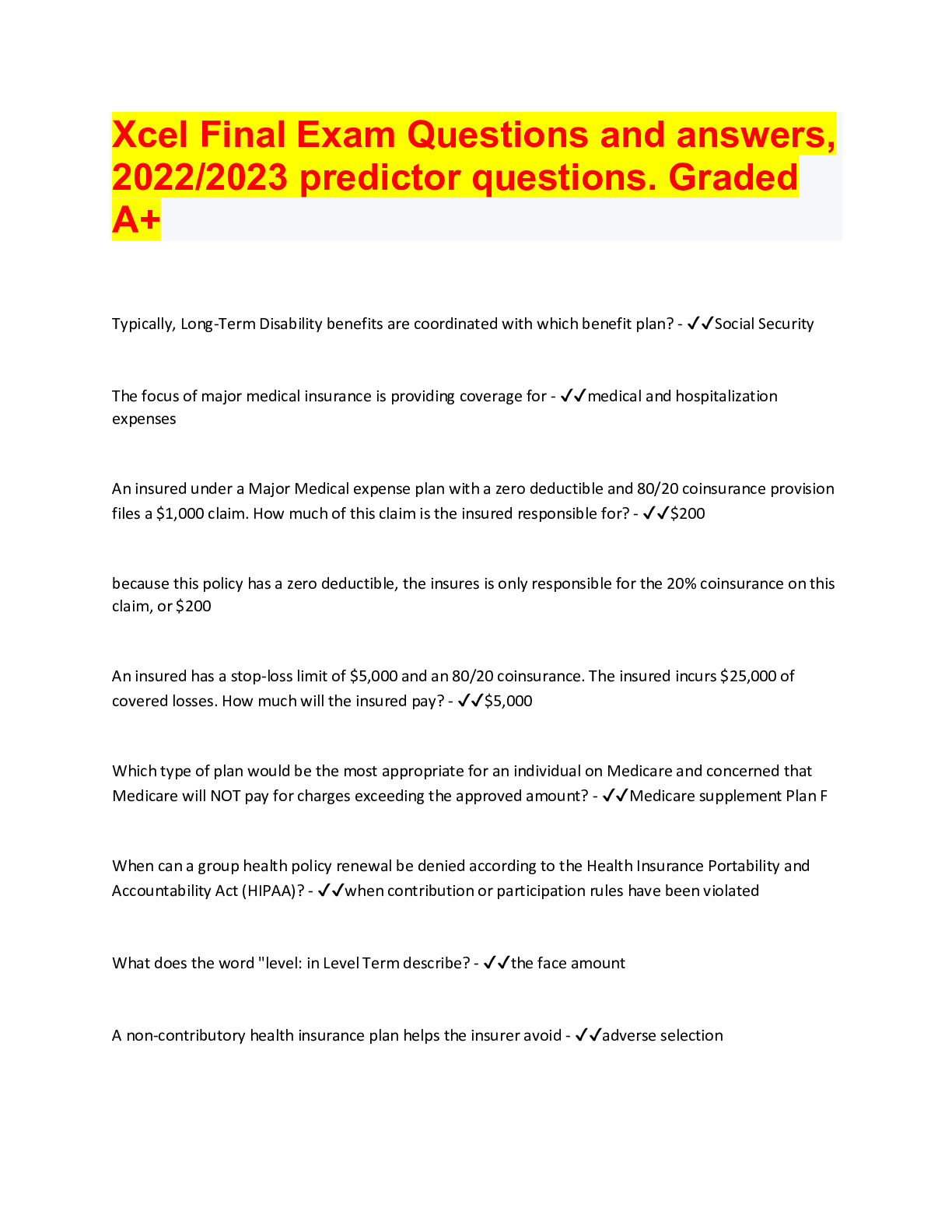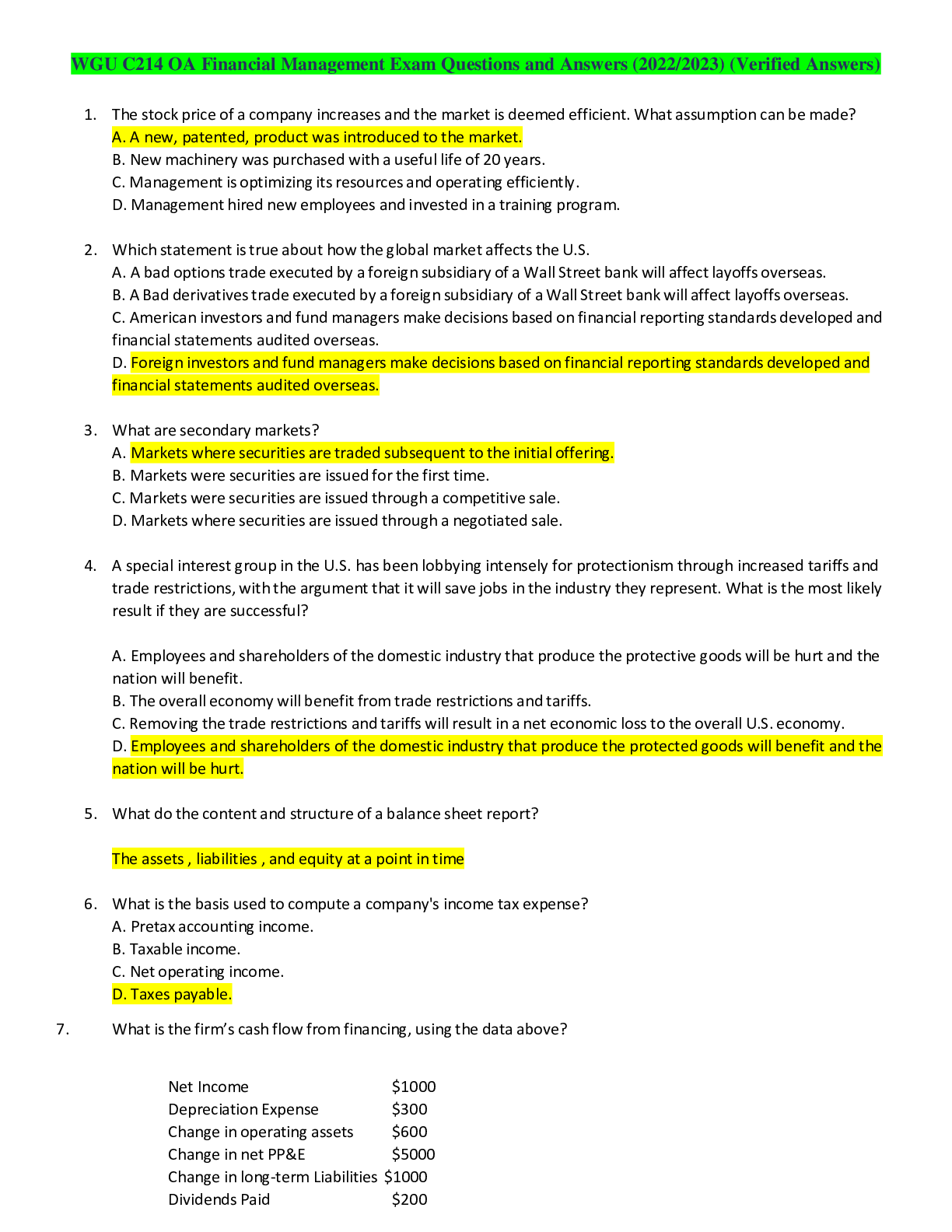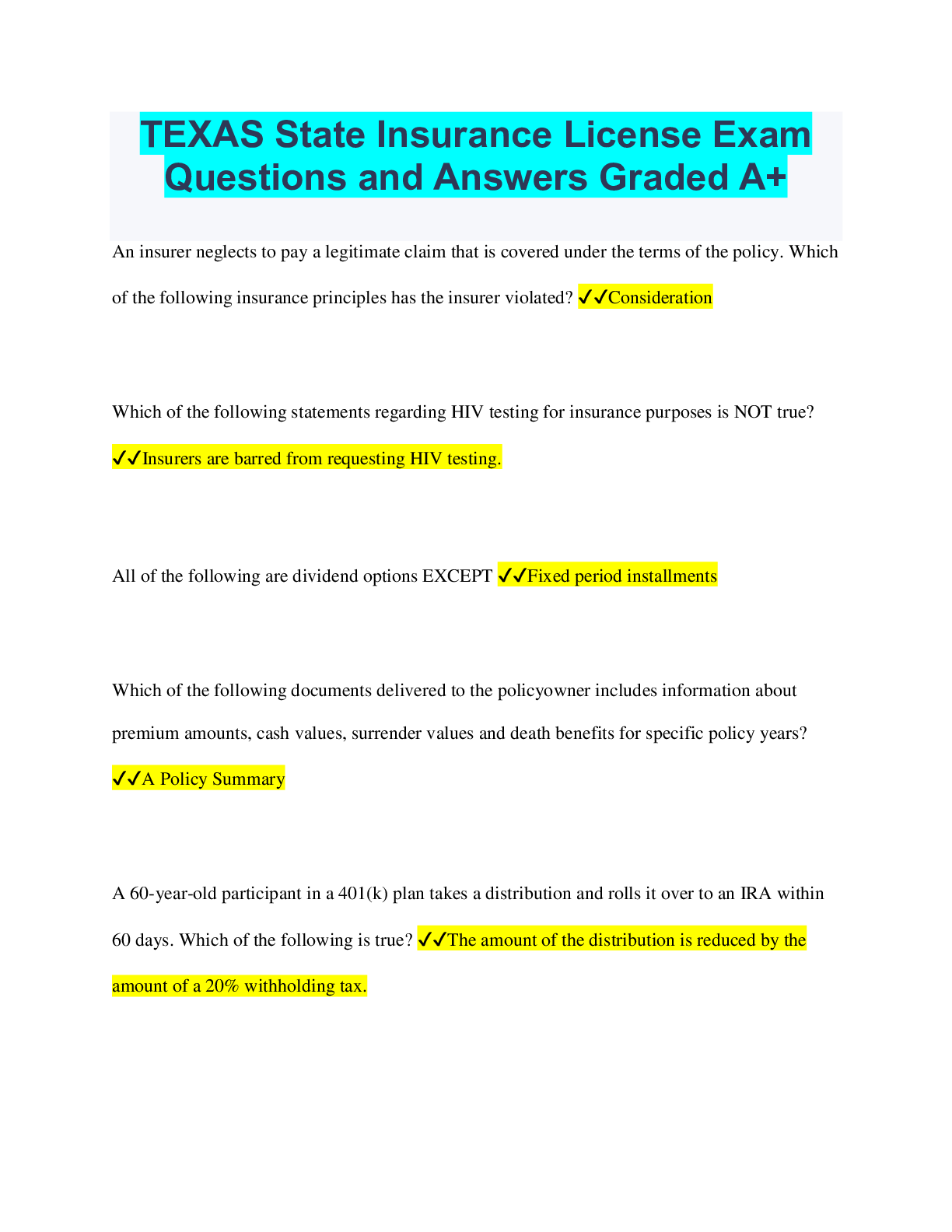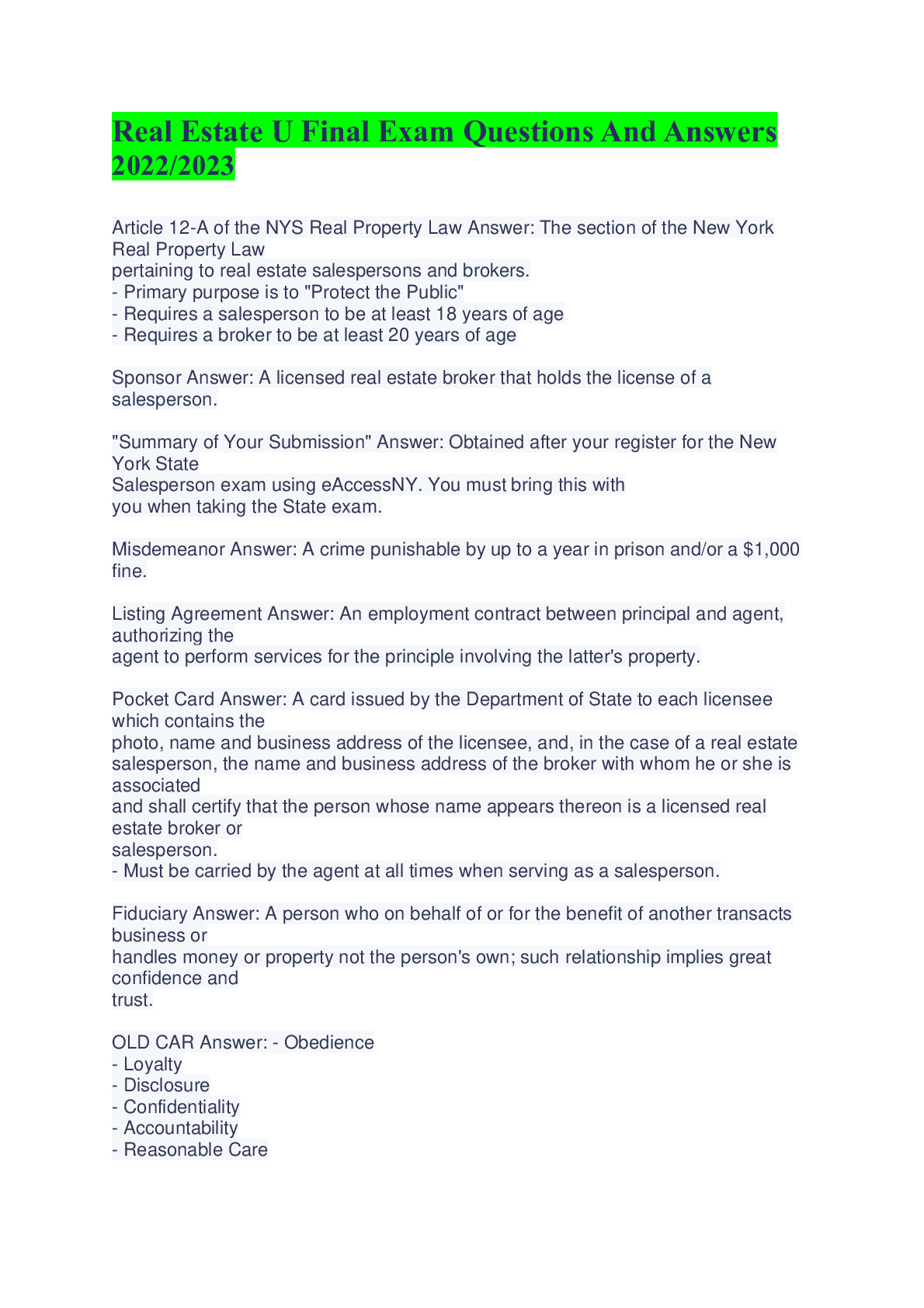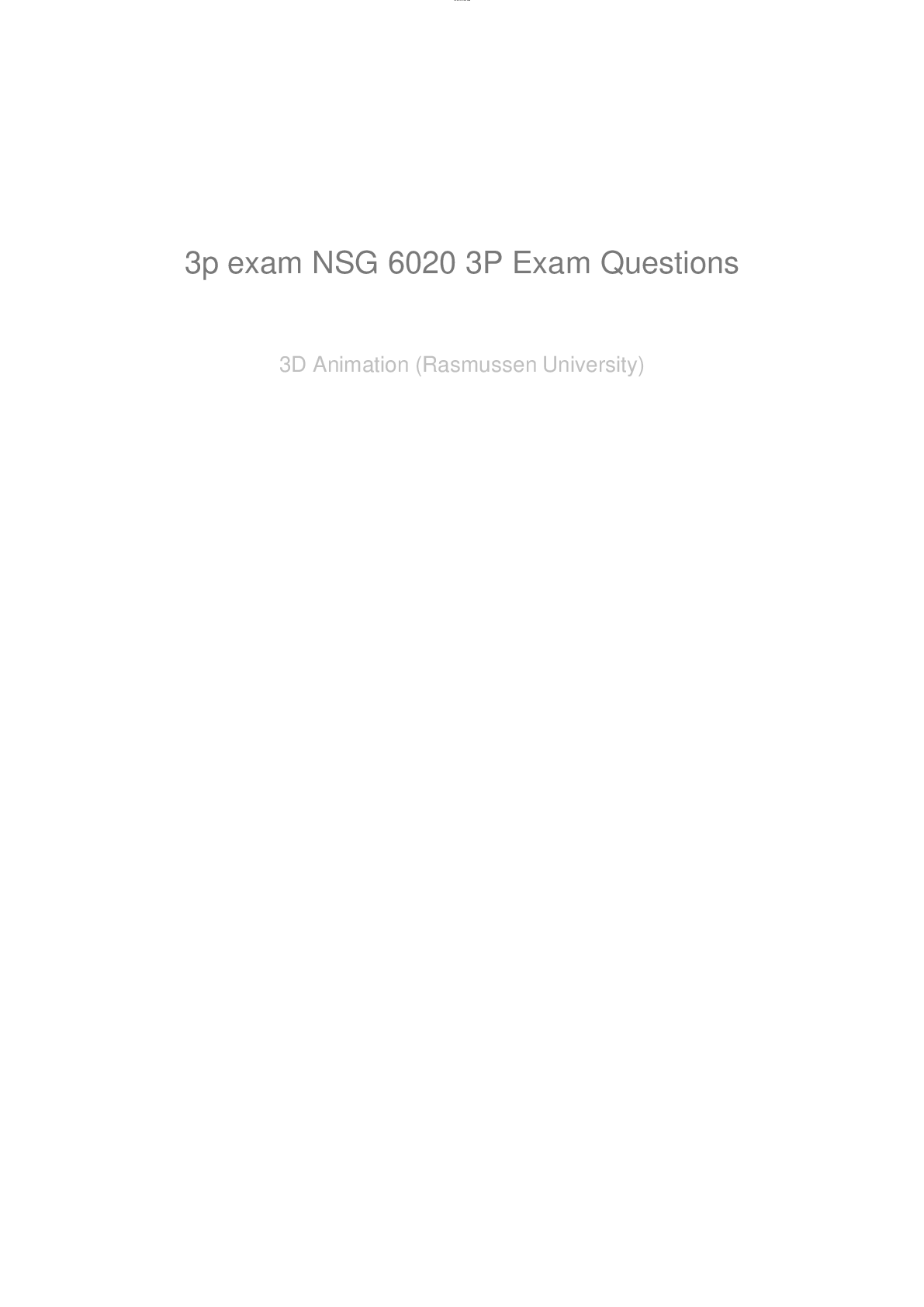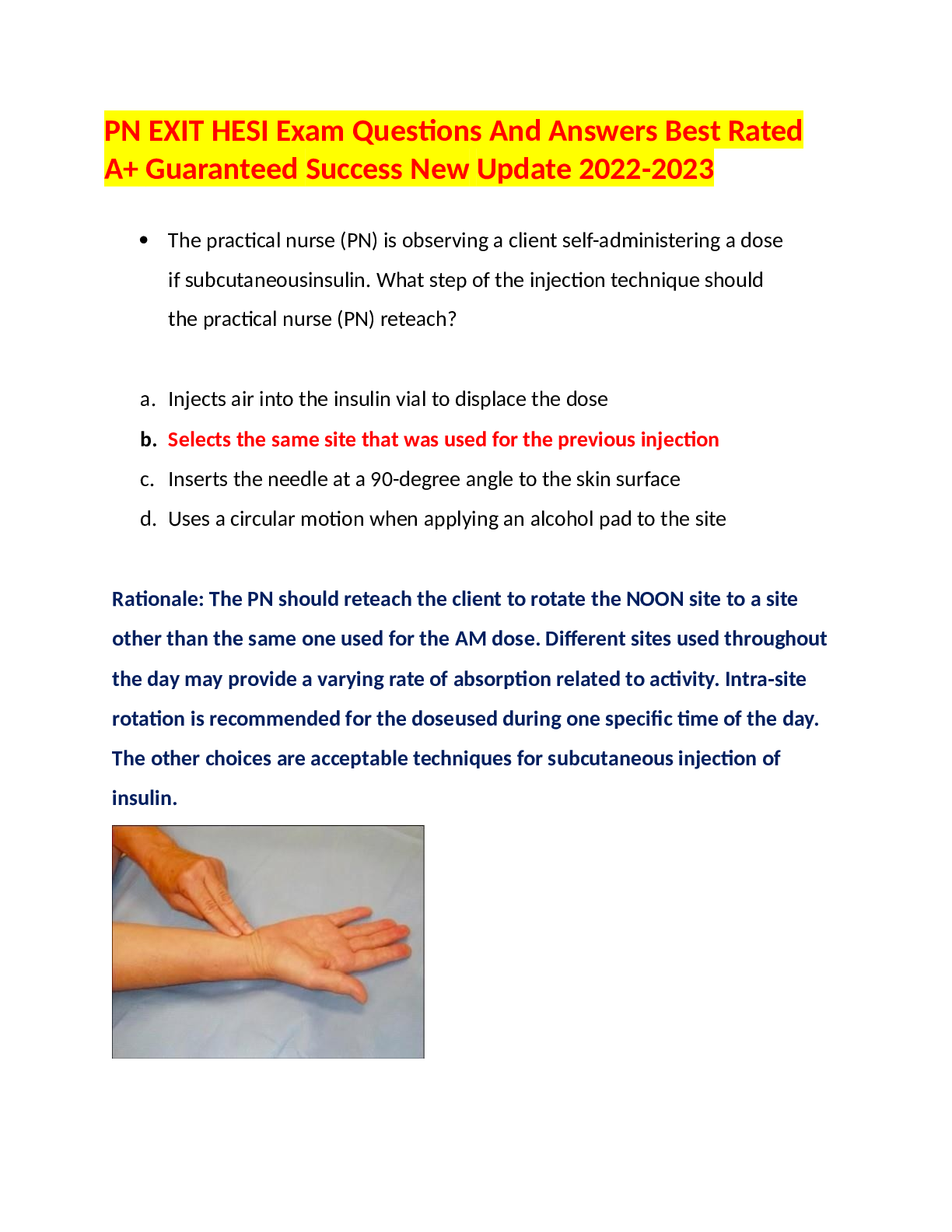Social Sciences > QUESTIONS & ANSWERS > AP Government Exam Questions and Answers 2022 (All)
AP Government Exam Questions and Answers 2022
Document Content and Description Below
activation - ANSWER One of three key consequences of electoral campaigns for voters, in which the voter is activated to contribute money or ring doorbells instead of just voting. Adarand Constructo... rs v. Peña - ANSWER 1995 SuCo decision: Federal programs that classify based on race should be assumed unconstitutional and put up to strict scrutiny. They're only okay if they are "narrowly tailored" for a "compelling governmental interest." Affirmative Action - ANSWER A policy designed to give special compensation to a previously disadvantaged group. Americans with Disabilities Act of 1990 - ANSWER Requires employers to make reasonable accommodations for the disabled, and not to discriminate against them in hiring. amicus curiae briefs - ANSWER Briefs submitted to the court by outside parties to influence the decision. Anti-Federalists - ANSWER At the time of the Con, they argued that the Con was a class based document, would erode fundamental liberties and weaken the states. antitrust policy - ANSWER Policy that ensures competition and prevents monopoly. appropriations bill - ANSWER Act of Cong that funds programs within authorized limits. Usually these bills are annual. Articles of Confederation - ANSWER First Con, adopted in 1777, enacted in 1781. They established a national legislature (Continental Congress), but left most authority with the states. authorization bill - ANSWER Act of Cong (type of bill) that makes or continues a government or entitlement program, also defines budget limits for said program. Barron v. Baltimore - ANSWER 1833 SuCo: The Bill of Rights only applies to the National Gvt. bicameral legislature - ANSWER A legislature divided into 2 houses, such as the US Congress and most state legislatures. bill - ANSWER A proposed law written in legal language. Only o member of Congress can submit one, although anyone can write one. Bill of Rights - ANSWER First 10 Amendments written to satiate Anti-Federalists. They define basic liberties and rights. blanket primaries - ANSWER Primaries in which voters can be from and vote for any party. block grants - ANSWER Federal grants automatically given to states to support broad programs. (Compared to categorical grants) Brown v. Board of Education - ANSWER 1954 SuCo: School segregation is unconstitutional because it violates the 14th Amendment guarantee of equal protection. Overturned Plessy v. Ferguson. budget - ANSWER A policy document allocating taxes and expenditures, budget resolution - ANSWER The bottom line for all federal spending. bureaucracy - ANSWER A system of departments and agencies formed to carry out the work of government. cabinet - ANSWER A group of presidential advisers. Consists of 14 secretaries and the attorney general. campaign strategy - ANSWER Master game plan of a political campaign. capitalism - ANSWER An economic system in which individuals and corporations, not the government, own the principle means of production and seek profit. casework - ANSWER Pork barreling, basically. Activities of Congressmen that help individual constituents. categorical grants - ANSWER Federal grants that can be used only for specific purposes. These grants have strings attached. (Compare to block grants) congressional caucus - ANSWER A group of Congressmen sharing an interest or characteristic. (Not the party version) state party caucus - ANSWER A meeting of all state party leaders for selecting delegates to the national party convention. Usuall organized as a pyramid (Not the congressional version) censorship - ANSWER Government regulation of media content. census - ANSWER Demographics report required by the Constitution to be redone every 10 years. checks and balances - ANSWER An important part of the Madisonian model designed to limit government's power by requiring power to be balanced among different institutions that check each other's activities. civic duty - ANSWER The belief that it is a citizen's duty to vote in order to support democracy. civil disobedience - ANSWER A form of political participation where people consciously break a law and suffer the consequences to make a point. civil law - ANSWER Judicial law not involving criminal charges. Cases are between 2 parties and involve common law. civil liberties - ANSWER Legal constitutional protections against government. (compare to civil rights) civil rights - ANSWER Policies designed to protect people against arbitrary or discriminatory treatment by government.(Compare to civil liberties) Civil Rights Act of 1964 - ANSWER Law that made racial discrimination in public places illegal and forbade many forms of job discrimination. It created the EEOC to monitor itself, provided for the withholding of federal grants to nonconformers, strengthened voting rights legislation, and authorized lawsuits that advanced desegregation. civil rights movement - ANSWER movement in the United States beginning in the 1960s and led primarily by Blacks in an effort to establish the civil rights of individual Black citizens civil rights policies - ANSWER Policies that extend government protection to particular disadvantaged groups. class action suits - ANSWER Lawsuits permitting a small number of people to sue on behalf of all others similarly situated. Clean Air Act of 1970 - ANSWER Law that charged the Department of Transportation with the responsibility of reducing automobile emissions. Clean Water Act of 1972 - ANSWER Law intended to clean up the nation's rivers and lakes. closed primaries - ANSWER Primaries in which only registered voters can participate. collective bargaining - ANSWER Bargaining between representatives of labor unions and management to determine acceptable working conditions. committee chairs - ANSWER The most important influencers of congressional agenda. They play dominant rules in scheduling hearings, hiring staff, appointing subcommittees and managing committee bills when they're in front of the full house. congressional committees - ANSWER Conference, joint, select and standing committees. common law - ANSWER The accumulation of past judicial decisions applied in civil law disputes. comparable worth - ANSWER The issue raised when women are paid less than men for working jobs that require comparable skill. conference committees - ANSWER Congressional committees directed to reconcile House and Senate versions of a bill. Congressional Budget Office - ANSWER The budget office that advises Congress on the consequences of budget decisions and forecasts revenues. Connecticut Compromise - ANSWER The compromise reached at the Constitutional Convention that reconciled the Virginia and New Jersey Plans, creating our bicameral legislature. consent of the governed - ANSWER the idea that government derives its authority by the sanction of the people conservatives - ANSWER Those who advocate conservatism. constitution - ANSWER A nation's basic law. consumer price index - ANSWER The key measure of inflation. continuing resolutions - ANSWER When Congress cannot agree on an appropriation bill, this resolution allows an agency to spend at the previous year's level. conversion - ANSWER When a voter's mind is changed in an electoral campaign. Council of Economic Advisers - ANSWER 3 appointees who advise the President on the state of the economy and economic policy courts of appeal - ANSWER Apellate courts that can review all final decisions from district courts. Craig v. Boren - ANSWER 1976 SuCo: Gender classifications are subject to medium scrutiny. criminal law - ANSWER The body of law used when one is charged with a criminal action that warrants punishment. critical election - ANSWER Election periods marked by national crisis where new issues emerge and the majority party is displaced by the minority. cruel and unusual punishment - ANSWER punishment prohibited by the 8th amendment to the U.S. constitution Declaration of Independence - ANSWER Document approved in 1776 that stated the grievances with Britain. deficit - ANSWER An excess of federal expenditures over federal revenues. democracy - ANSWER Government by the people. demography - ANSWER The science of population changes. deregulation - ANSWER the act of freeing from regulation (especially from governmental regulations) direct democracy - ANSWER Procedures by which voters have a direct impact on policymaking by means of a voting booth. direct primaries - ANSWER an election in which voters shoose candidates to represent each party in a general election district courts - ANSWER Lowest level of fed. courts, where fed. cases begin &trials are held (bank robbery, environmental violations, tax evasion) dual federalism - ANSWER A system of govt in which both the national and state governments are supreme in their own spheres. due process clause - ANSWER Part of the 14th amendment which guarantees that no state deny basic rights to its people without due process of law. elastic clause - ANSWER the part of the Constitution that permits Congress to make any laws "necessary and proper" to carrying out its powers electoral college - ANSWER the body of electors who formally elect the United States president and vice-president electoral mandate - ANSWER A concept based on the idea that "the people have spoken." It is a powerful symbol in American electoral politics, according legitimacy and credibility to a newly elected president's proposals. elite - ANSWER a group or class of persons enjoying superior intellectual or social or economic status elite theory - ANSWER A theory of government and politics contending that societies are divided along class lines and that an upper-class elite will rule, regardless of the formal niceties of governmental organization. Engel v. Vitale - ANSWER 1962 SuCo: Prayer in school is a violation of the 1st Amendment. entitlement programs - ANSWER programs that provide benefits to eligible citizens. An uncontrollable expenditure. enumerated powers - ANSWER The powers explicitly given to Congress in the Constitution. Environmental Protection Agency - ANSWER An agency created in 1970 to administer all environmental legislation. equal opportunity - ANSWER the right to equivalent opportunities for employment regardless of race or color or sex or national origin equal protection of the laws - ANSWER a right guaranteed by the 14th amendment to the US constitution and by the due-process clause of the 5th amendment. It was a major part of Brown v. Board of Education. equal results - ANSWER An idea that government must go beyond equal opportunity. Equal Rights Amendment - ANSWER constitutional amendment passed by Congress but never ratified that would have banned discrimination on the basis of gender establishment clause - ANSWER the First Amendment guarantee that the government will not create and support an official state church exclusionary rule - ANSWER Evidence obtained unconstitutionally can not be used in court. executive orders - ANSWER regulations originating from the executive branch. They are one method presidents can use to control the bureaucracy. exit poll - ANSWER a poll of voters as they leave the voting place expenditures - ANSWER Federal spending of revenues, mostly spent on social services and military. extradition - ANSWER the surrender of an accused or convicted person by one state or country to another (usually under the provisions of a statute or treaty) factions - ANSWER Interest groups arising from the unequal distribution of property or wealth that James Madison attacked in Federalist Paper No. 10. Today's parties or interest groups are what Madison had in mind when he warned of the instability in government caused by these. federal debt - ANSWER all the money borrowed by the federal government over the years and still outstanding Federal Election Campaign Act - ANSWER law passed in 1974 for reforming campaign finances. The act created the Federal Election Commission (FEC), provided public financing for presidential primaries and general elections, limited presidential campaign spending, required disclosure, and attempted to limit contributions. Federal Election Commission - ANSWER A commission created by the 1974 amendments to the Federal Election Campaign Act to administer election reform laws. Its duties include overseeing disclosure of campaign finance information and public funding of presidential elections, and enforcing contribution limits. Federal Regulation of Lobbying Act - ANSWER 1946; intended to allow the government to monitor lobbying activities by requiring lobbyists to register with the government and publicly disclose their salaries, expenses, and nature of activities in DC Federal Reserve System - ANSWER The country's central banking system, which is responsible for the nation's monetary policy by regulating the supply of money and interest rates Federal Trade Commission - ANSWER (WW) 1914 , A government agency established in 1914 to prevent unfair business practices and help maintain a competitive economy, support antitrust suits federalism - ANSWER a form of government in which power is divided between the federal, or national, government and the states Federalist Papers - ANSWER a series of 85 essays written by Hamilton, Madison, and Jay (using the name "publius") published in NY newspapers and used to convice readers to adopt the new constitution Federalist Paper 10 - ANSWER The Federalist Paper warning against faction such as interest groups and political parties Federalist Paper 51 - ANSWER The Federalist Paper advocating three seperate, independant branches with the same amount of power. Government should control people, but also its self, and individual rights should be protected. Federalists - ANSWER Supporters of the Constitution that were led by Alexander Hamilton and John Adams. They firmly believed the national government should be strong. They didn't want the Bill of Rights because they felt citizens' rights were already well protected by the Constitution. filibuster - ANSWER a tactic used only in the Senate for delaying or obstructing legislation by making long speeches or talking a bill to death fiscal federalism - ANSWER The pattern of spending, taxing, and providing grants in the federal system; it is the cornerstone of the national government's relations with state and local governments. fiscal policy - ANSWER a government policy for dealing with the budget (especially with taxation and borrowing) entirely determined by Congress and the Prez Food and Drug Administration - ANSWER Federal agency formed in 1913 that approves all foods and drugs for sale in the US. foreign policy - ANSWER a nation's overall plan for dealing with other nations formula grants - ANSWER Federal Categorical Grants distributed according to a formula specified in legislation or in administrative regulations fragmentation - ANSWER A situation in which responsibility for a policy area is dispersed, making it difficult to coordinate the policy. free excercise clause - ANSWER 1st amendment guarantee that prohibits gov't from unduly interfering with the free excercise of religion free-rider problem - ANSWER the problem faced by interest groups when citizens can reap the benefits of interest group action without actually joining, participating in, or contributing money to such groups. frontloading - ANSWER the recent tendency of states to hold primaries early in the calendar in order to capitalize on media attention full faith and credit clause - ANSWER Clause in the Constitution (Article IV, Section 1) requiring each state to recognize the civil judgments rendered by the courts of the other states and to accept their public records and acts as valid gender gap - ANSWER A term that refers to the regular pattern by which women are more likely to support Democratic candidates. Women tend to be significantly less conservative than men and are more likely to support spending on social services and to oppose higher levels of military spending. Gibbons v. Ogden - ANSWER 1824 SuCo: Gave Congress the power to regulate interstate commerce Gideon v. Wainwright - ANSWER 1963 SuCo: Anyone accused of a felony where jail time is possible has a right to a lawyer. Gitlow v. New York - ANSWER 1925 SuCo: Freedoms of press and speech are "fundamental personal rights and liberties protected by the due process clause of the 14th amendment from impairment" government - ANSWER the system or form by which a community or other political unit is governed government corporation - ANSWER A government agency that operates like a business corporation, created to secure greater freedom of action and flexibility for a particular program. governor - ANSWER the head of a state government Gramm-Rudman-Hollings Act - ANSWER Also known as Balanced Budget and Emergency Deficit Act, this act mandates maximum allowable deficits until 1991 when the budget should balance. It was abandoned in 1991. grandfather clause - ANSWER clause included in the state constitutions of several southern states after the Civil War placing high literacy and property requirements for voters whose ancestors did not vote before 1867. These clauses were designed to interfere with African-American citizens' right to vote. In 1915, the Supreme Court ruled them unconstitutional. Gregg v. Georgia - ANSWER 1976 SuCo: The death penalty is not cruel and unusual punishment. GDP - ANSWER total dollar value of all final goods and services produced in a country during a single year Hatch Act - ANSWER A federal law prohibiting government employees from active participation in partisan politics. House Rules Committee - ANSWER An institution unique to the House of Representatives that reviews all bills (except revenue, budget, and appropriations bills) coming from a House committee before they go to the full House. House Ways and Means Committee - ANSWER The House of Representatives committee that, along with the Senate Finance Committee, writes the tax codes, subject to the approval of Congress as a whole. hyperpluralism - ANSWER Theory that groups are so strong that they weaken the government. Exaggerated version of pluralism. impeachment - ANSWER The political equivalent of an indictment in criminal law, prescribed by the Constitution. implementation - ANSWER The process of putting a law into practice through bureaucratic rules or spending. implied powers - ANSWER Powers of government that go beyond their enumerated powers. Generally supported by the elastic clause. income - ANSWER The amount of funds collected. income tax - ANSWER Direct tax on the earnings of individuals and corporations incorporation doctrine - ANSWER the legal concept under which the Supreme Court has nationalized the Bill of Rights by making most of its provisions applicable to the states through the fourteenth amendment incrementalism - ANSWER The belief that the best predictor of this year's budget is last year's budget, plus a little bit more (an increment). incumbents - ANSWER Those already holding office. independent executive agency - ANSWER The government not accounted for by cabinet departments, independent regulatory agencies, and government corporations. Its administrators are typically appointed by the president and serve at the president's pleasure. NASA is an example. independent regulatory agency - ANSWER a government agency responsible for some sector of the economy, making and enforcing rules to protect the public interest. It also judges disputes over these rules. inflation - ANSWER increased prices for goods and services combined with the reduced value of money initiative - ANSWER Voters may put a proposed change to the state constitution to a vote if sufficient petitions have called for the referendum. interest group - ANSWER an organization of people sharing a common interest or goal that seeks to influence the making of public policy iron triangles - ANSWER Entities composed of a bureaucratic agency, an interest group, and a congressional committee. They dominate certain areas of policymaking. joint committees - ANSWER Congressional committees on a few subject-matter areas with membership drawn from both houses. judicial activism - ANSWER A judicial philosophy in which judges make bold policy decisions, even charting new constitutional ground. Advocates of this approach emphasize that the courts can correct pressing needs, especially those unmet by the majoritarian political process. judicial implementation - ANSWER how and whether court decisions are translated into actual policy, thereby affecting the behavior of others; the courts rely on other units of government to enforce their decisions judicial restraint - ANSWER A judicial philosophy in which judges play minimal policymaking roles, leaving that duty strictly to the legislatures judicial review - ANSWER The power of a court to determine the constitutionality of a governmental action justiciable disputes - ANSWER a constraint on the courts requiring case be capable of being settled by legal methods Keynesian economic theory - ANSWER The theory emphasizing that government spending and deficits can help the economy weather its normal ups and downs. Proponents of this theory advocate using the power of government to stimulate the economy when it is lagging. Korematsu v. United States - ANSWER 1944 SuCo: Japanese internment camps were constitutional. labor union - ANSWER an organization of employees formed to bargain with the employer laissez faire - ANSWER idea that government should play as small a role as possible in economic affairs legislative courts - ANSWER Courts established by Congress for specialized purposes where the judges have fixed terms. legislative oversight - ANSWER Congress's monitoring of the bureaucracy performed mainly through hearings. legislative proposal - ANSWER A method of s, the most common means of amending a state constitution wherin the state legislature propses a revision usually by a two-thirds majority legislative turnover - ANSWER The rate of incumbent state legislators leaving office legislative veto - ANSWER The ability of Congress to override a presidential veto, provided by the War Powers Resolution. It is criticized for defeating the system of checks and balances. legislators - ANSWER Elected representatives who make public policy. Lemon v. Kurtzman - ANSWER 1971 SuCo: Federal funding to religious schools must (1) have a secular legislative purpose (2) primarily not effect religion and (3) not get the government involved with religion libel - ANSWER The publication of false or malicious statements that damage someone's reputation. liberalism - ANSWER A political ideology whose advocates prefer a government active in dealing with human needs, support individual rights and liberties, and give higher priority to social needs than military needs. limited government - ANSWER The idea that certain things are untouchable by government because of the natural rights of its citizens. (related to John Locke) line-item veto - ANSWER A power of state governors to veto only certain parts of a bill and let the rest pass. linkage institutions - ANSWER The channels through which people's concerns become political issues on the government's policy agenda. In the United States, they include elections, political parties, interest groups, and the media. litigants - ANSWER The plaintiff and defendant in a case. lobbying - ANSWER direct contact made by an interest group representative in order to persuade government officials to support the policies their interest group favors majority leader - ANSWER The principal partisan ally of the Speaker of the House or the party's manager in the Senate. The majority leader is responsible for scheduling bills, influencing committee assignments, and rounding up votes in behalf of the party's legislative positions. majority rule - ANSWER A fundamental principle of traditional democratic theory where the majority's desires must be respected. mandate theory of elections - ANSWER The idea that the winning candidate has a mandate from the people to carry out his or her platforms and politics. Politicians like the theory better than political scientists do. Mapp v. Ohio - ANSWER 1961 SuCo: Incorporated the 4th Amendment protection against unreasonable search and seizure, as well as the exclusionary rule. Marbury v. Madison - ANSWER 1803 SuCo: Established judicial review. mass media - ANSWER Tv, radio, newspapers, magazines and all other forms of popular broadcasting. McCleskey v. Kemp - ANSWER 1987 SuCo: Upheld the death penalty, and said that the death penalty is not racist. McCulloch v. Maryland - ANSWER 1819 SuCo: Congress has certain implied powers as well as their enumerated powers, and the national government is supreme. McGovern-Fraser Commission - ANSWER required the delegates of the democratic party to represent more minorities means-tested programs - ANSWER Government programs available only to individuals below the poverty line. Medicaid - ANSWER A public assistance program designed to provide healthcare to poor Americans. (Compare to Medicare) Medicare - ANSWER A program that provides health benefits to s [Show More]
Last updated: 1 year ago
Preview 1 out of 31 pages
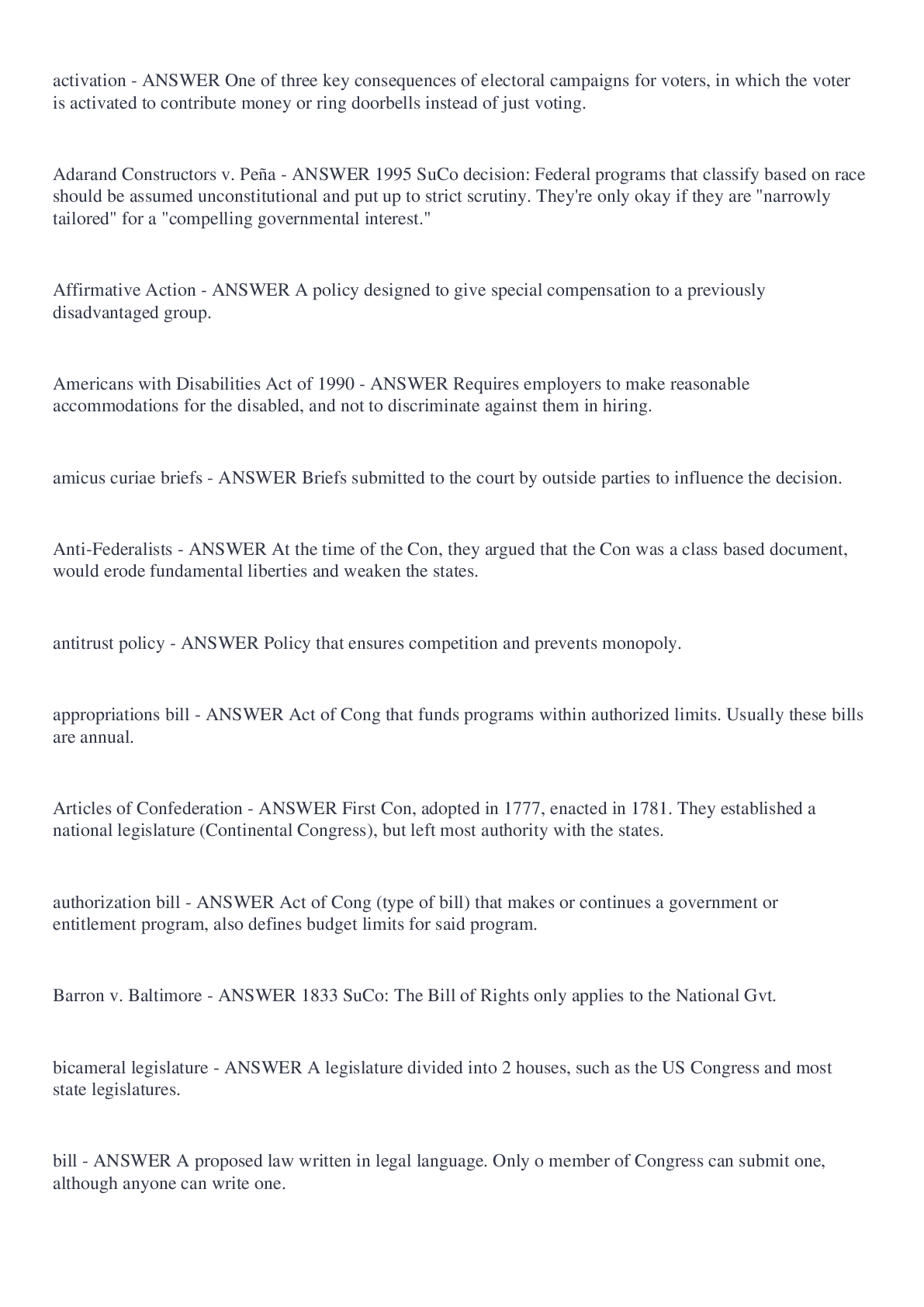
Also available in bundle (1)
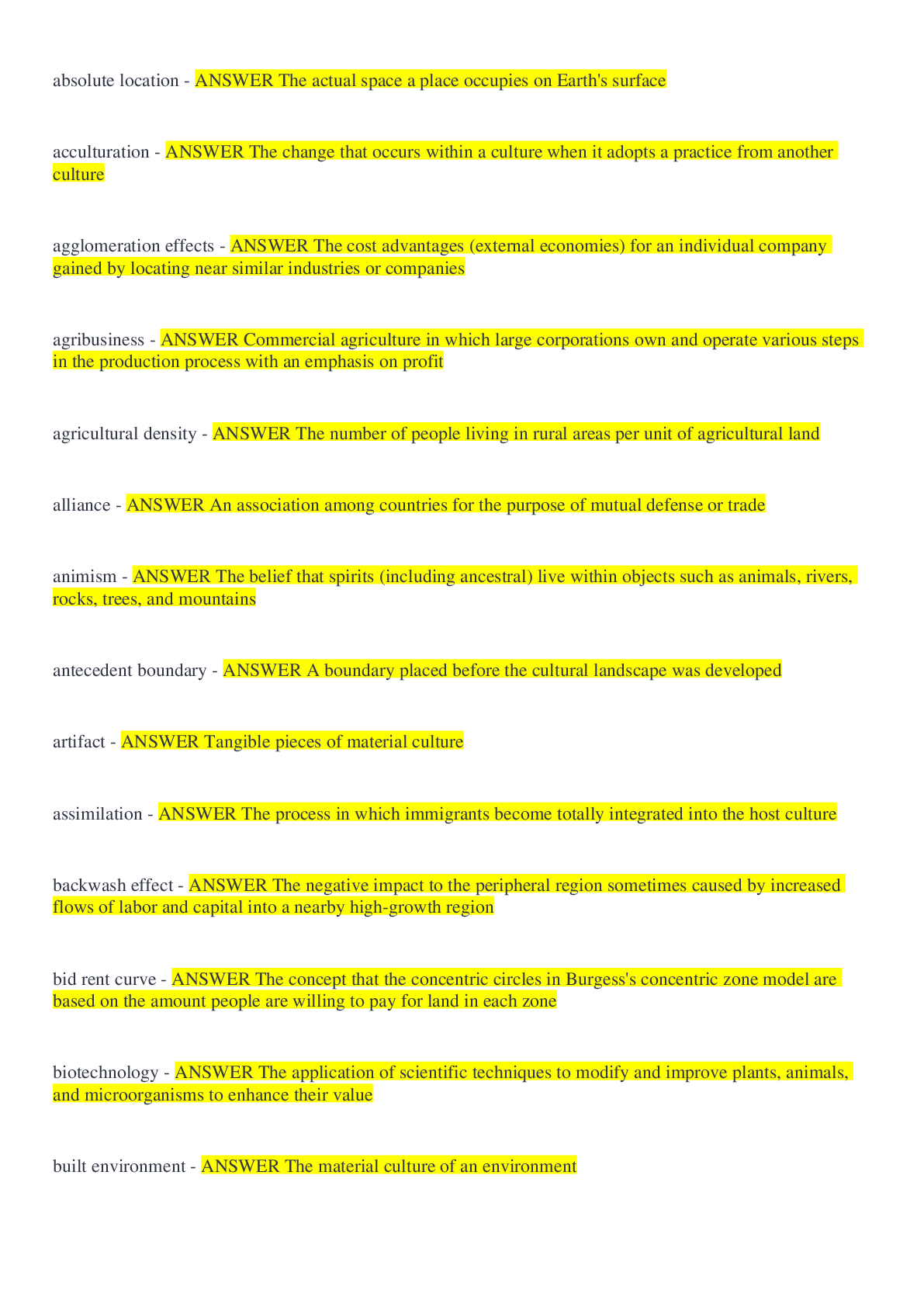
AP Human Geography /AP Psychology /AP Government BUNDLED EXAM GRADED A ( FULL PACK SOLUTION 2022)
AP Human Geography Exam Review - 2022 AP Psychology Exam Review 2022 AP Government Exam Questions and Answers 2022
By Nancylect 1 year ago
$6.5
3
Reviews( 0 )
Document information
Connected school, study & course
About the document
Uploaded On
Aug 08, 2022
Number of pages
31
Written in
Additional information
This document has been written for:
Uploaded
Aug 08, 2022
Downloads
0
Views
45

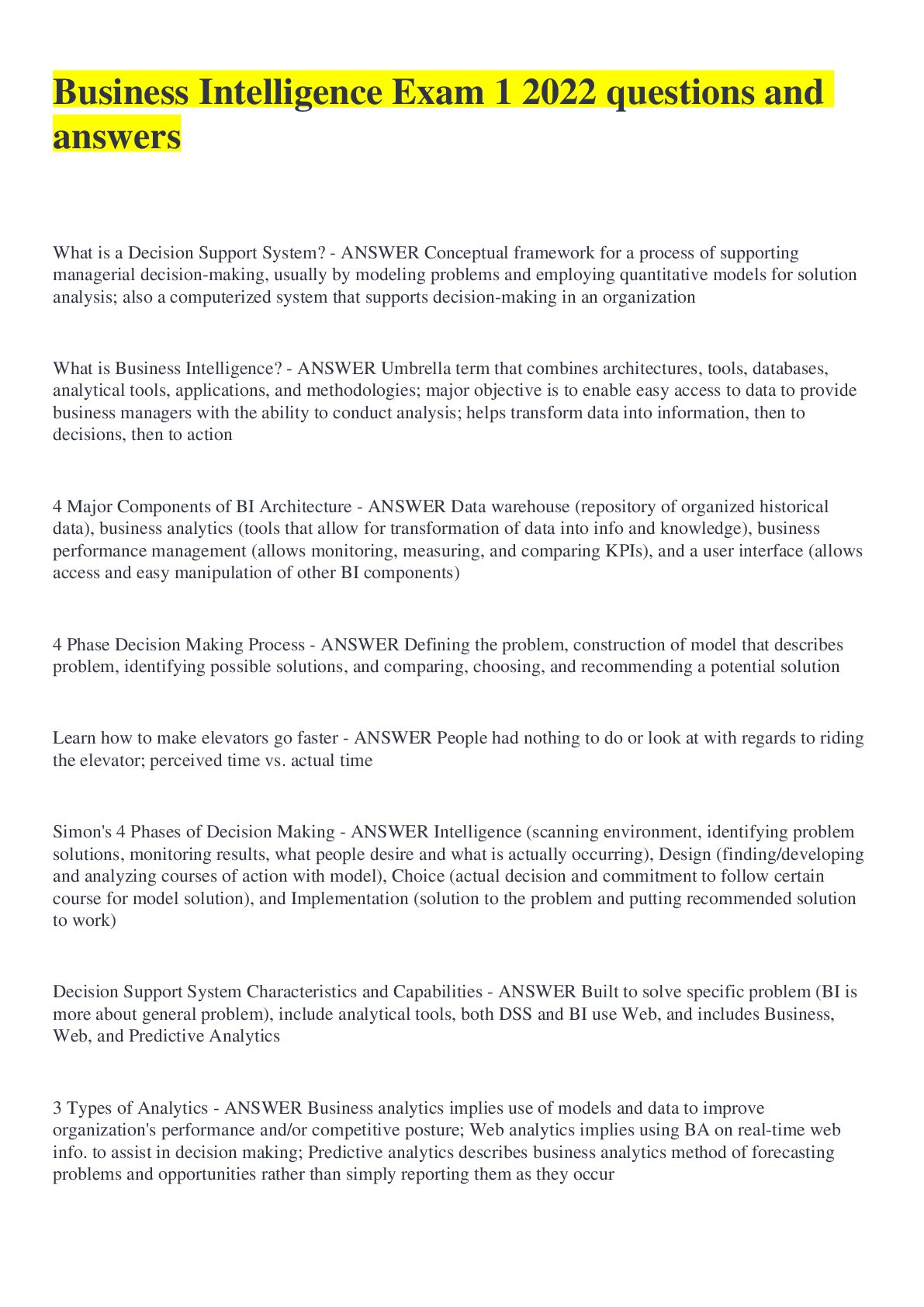


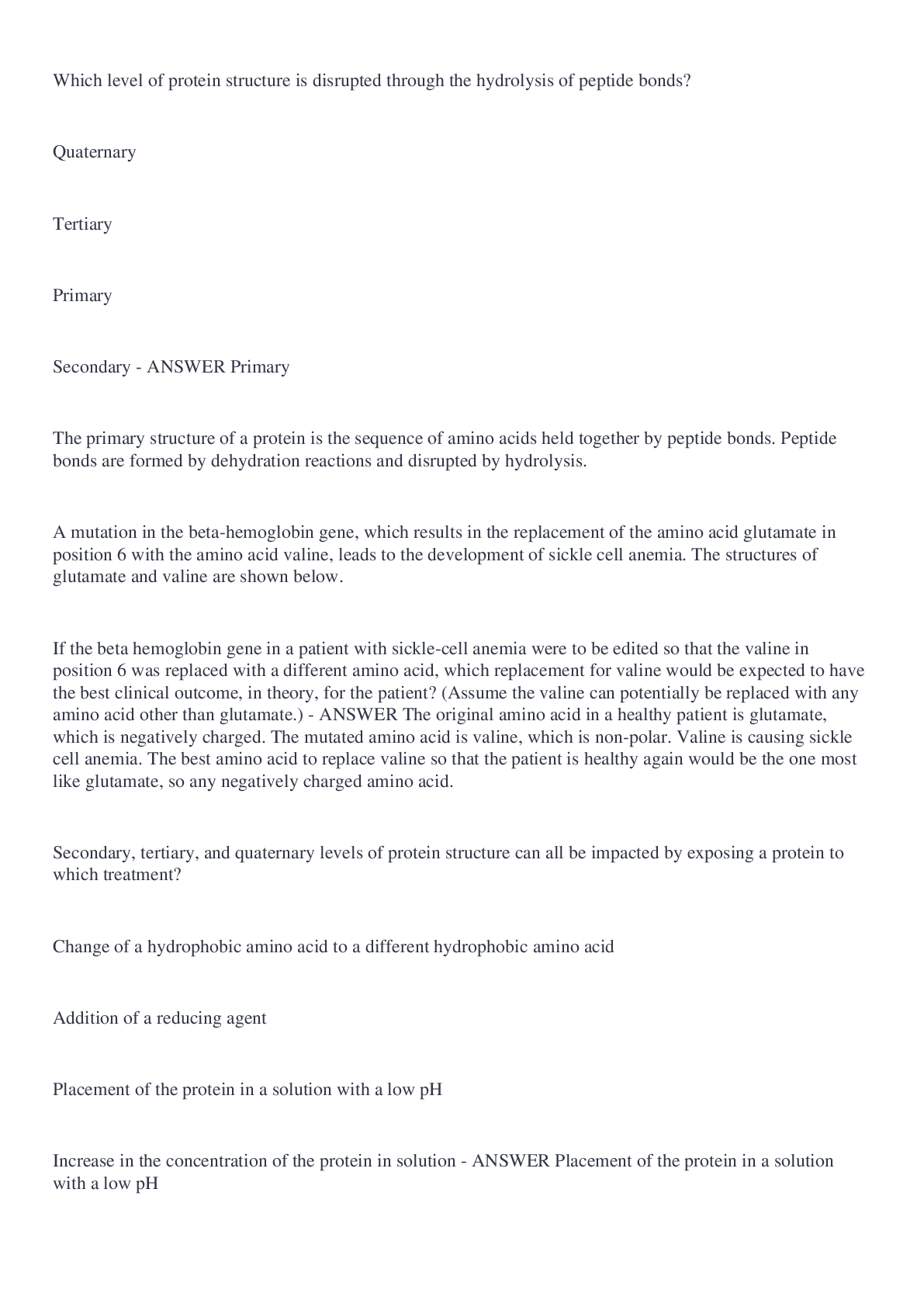


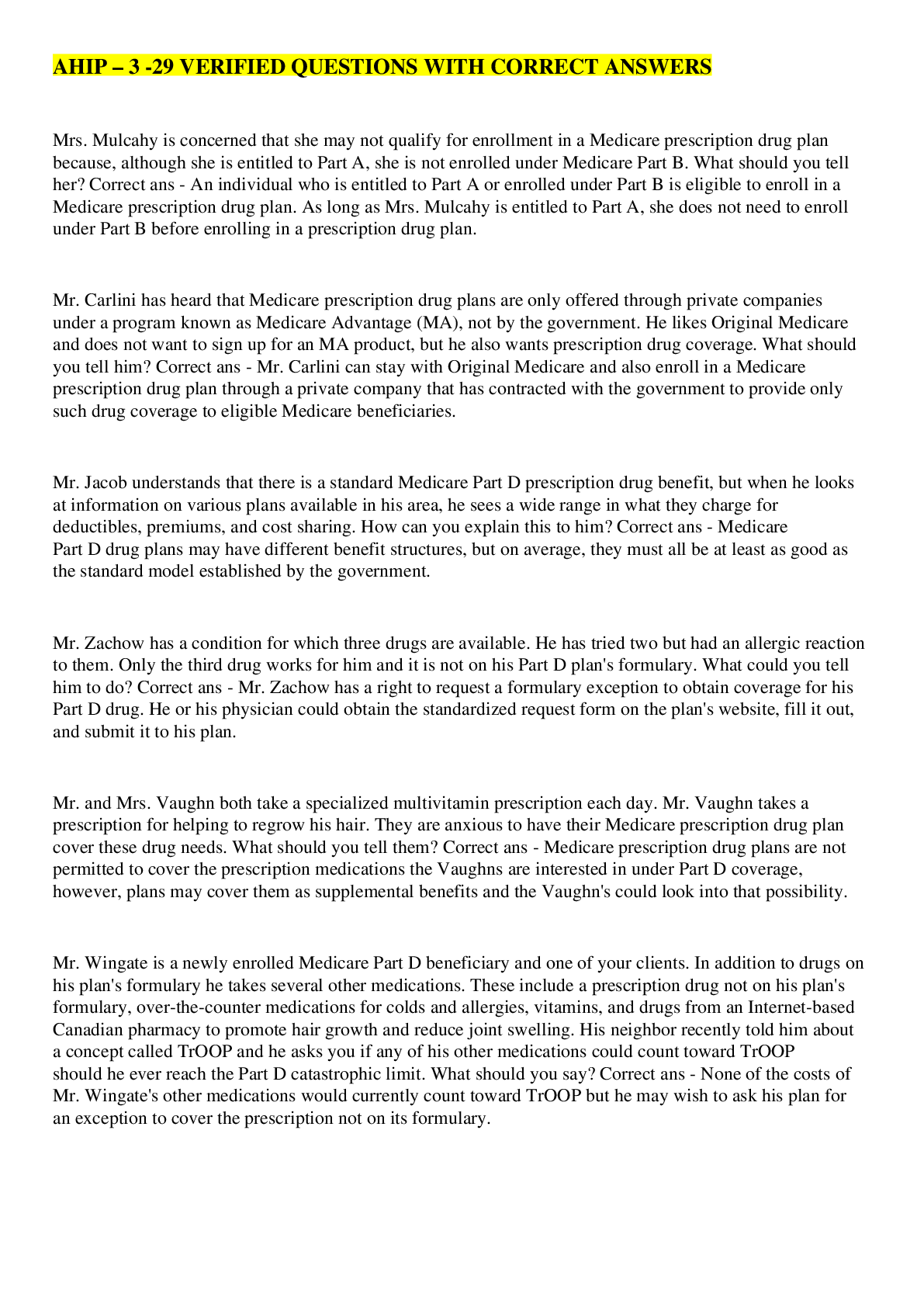
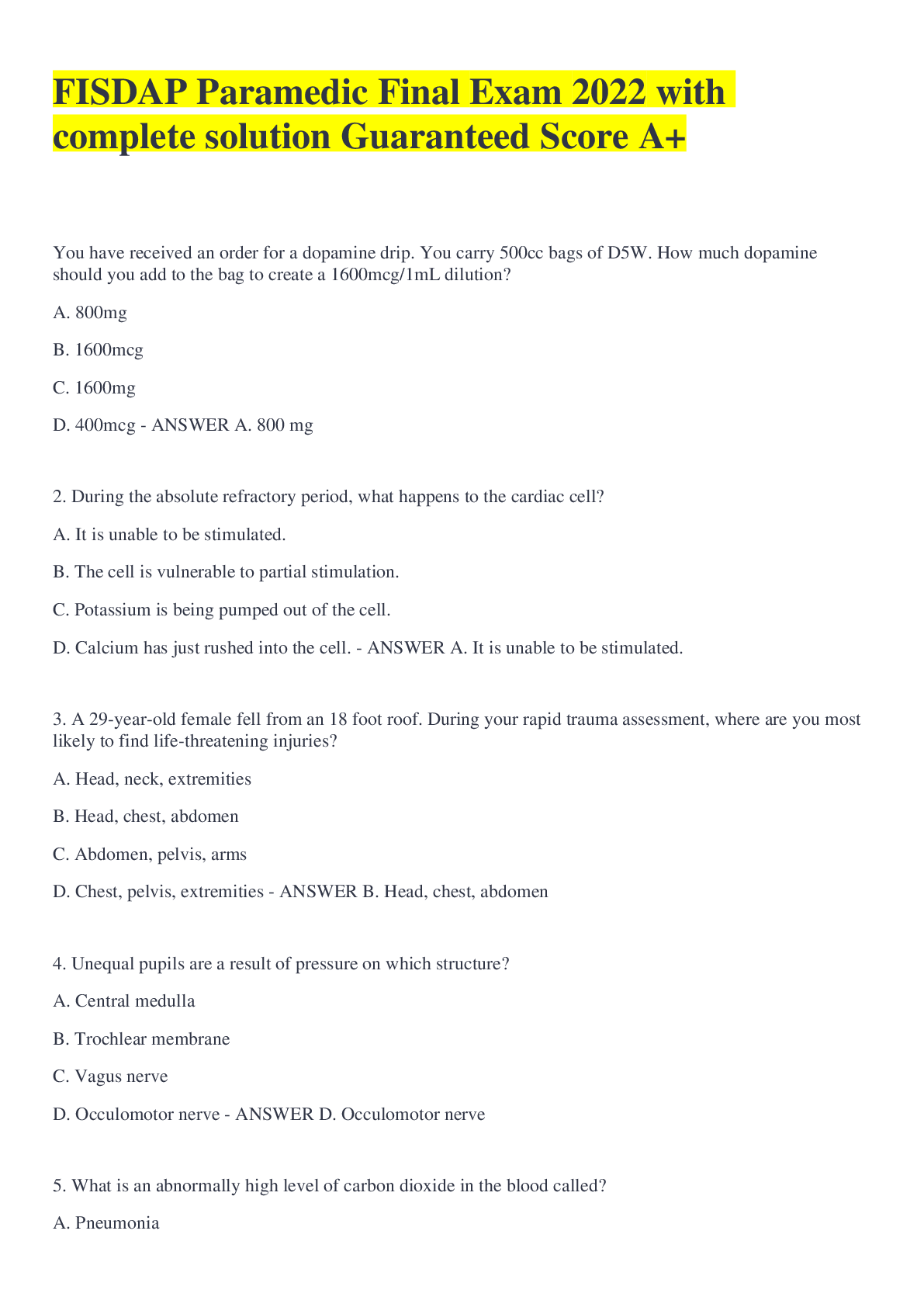

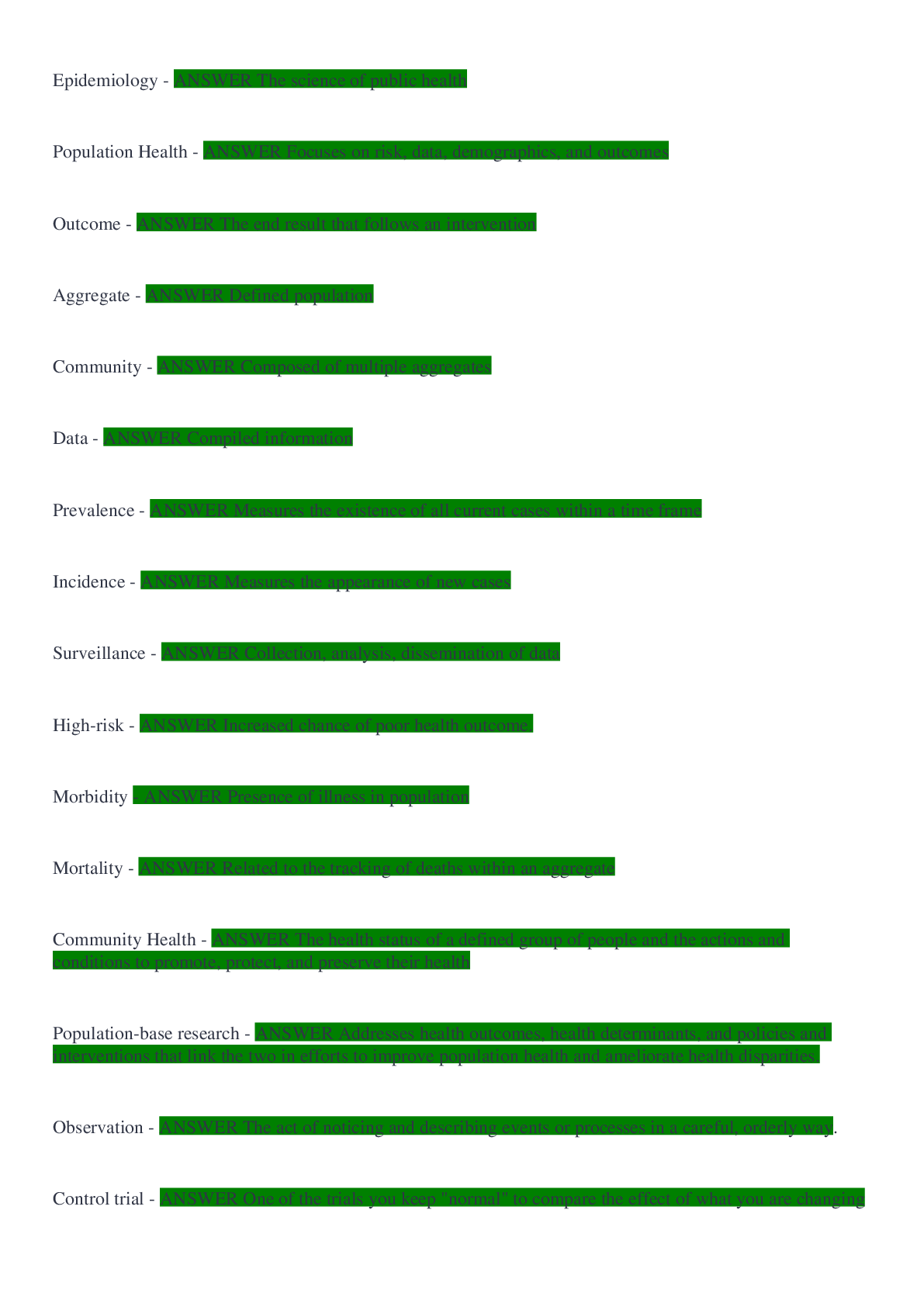
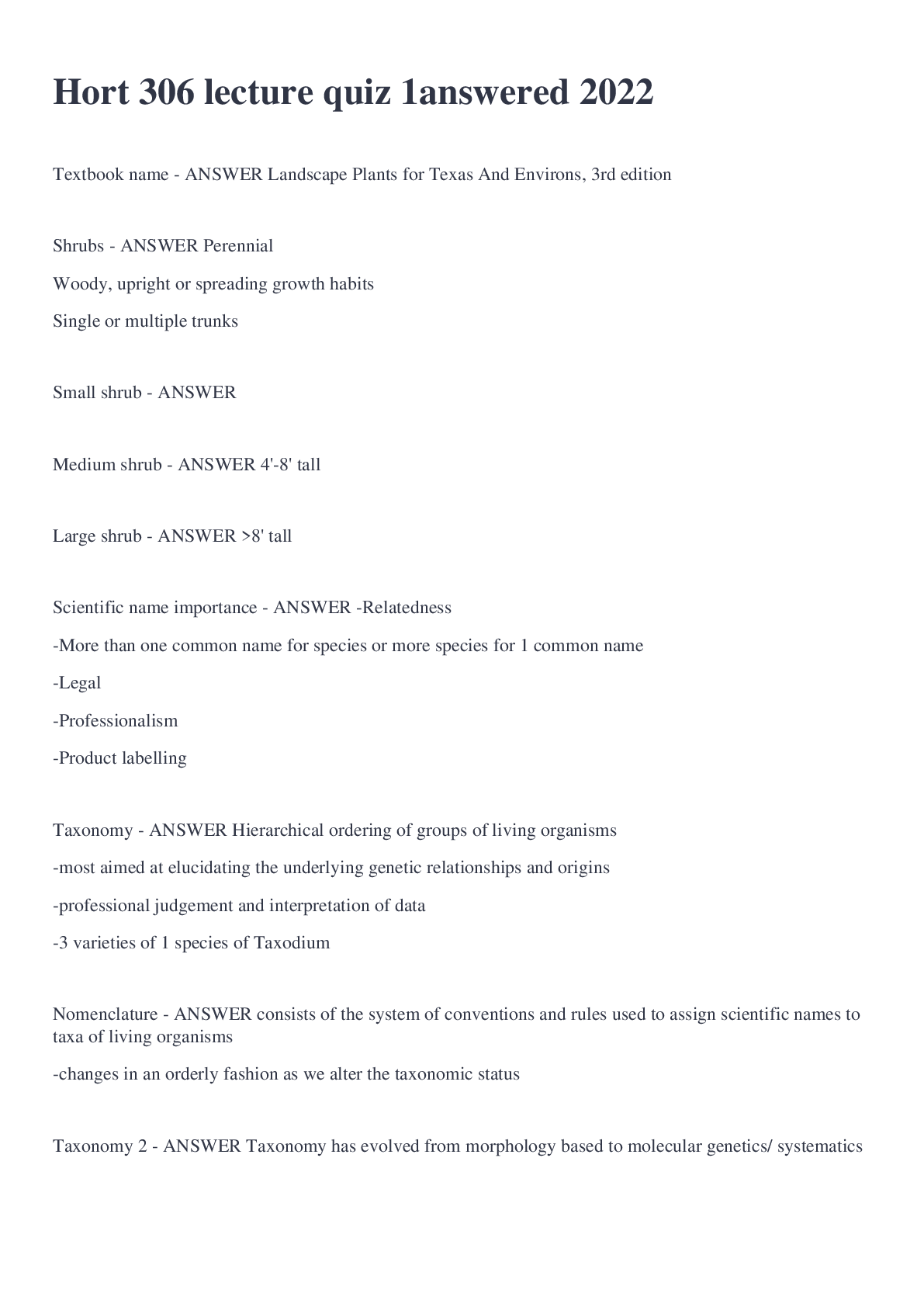
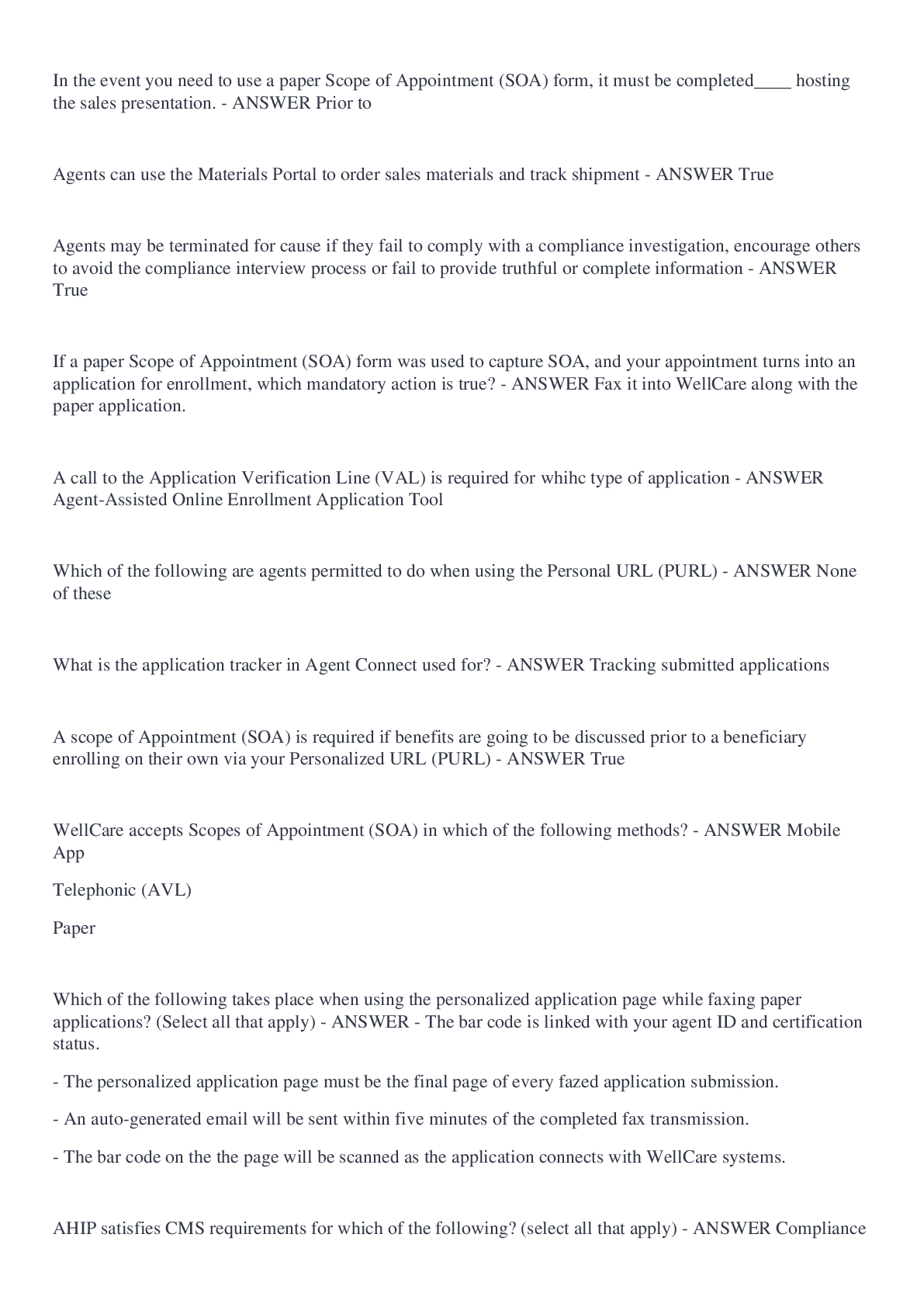
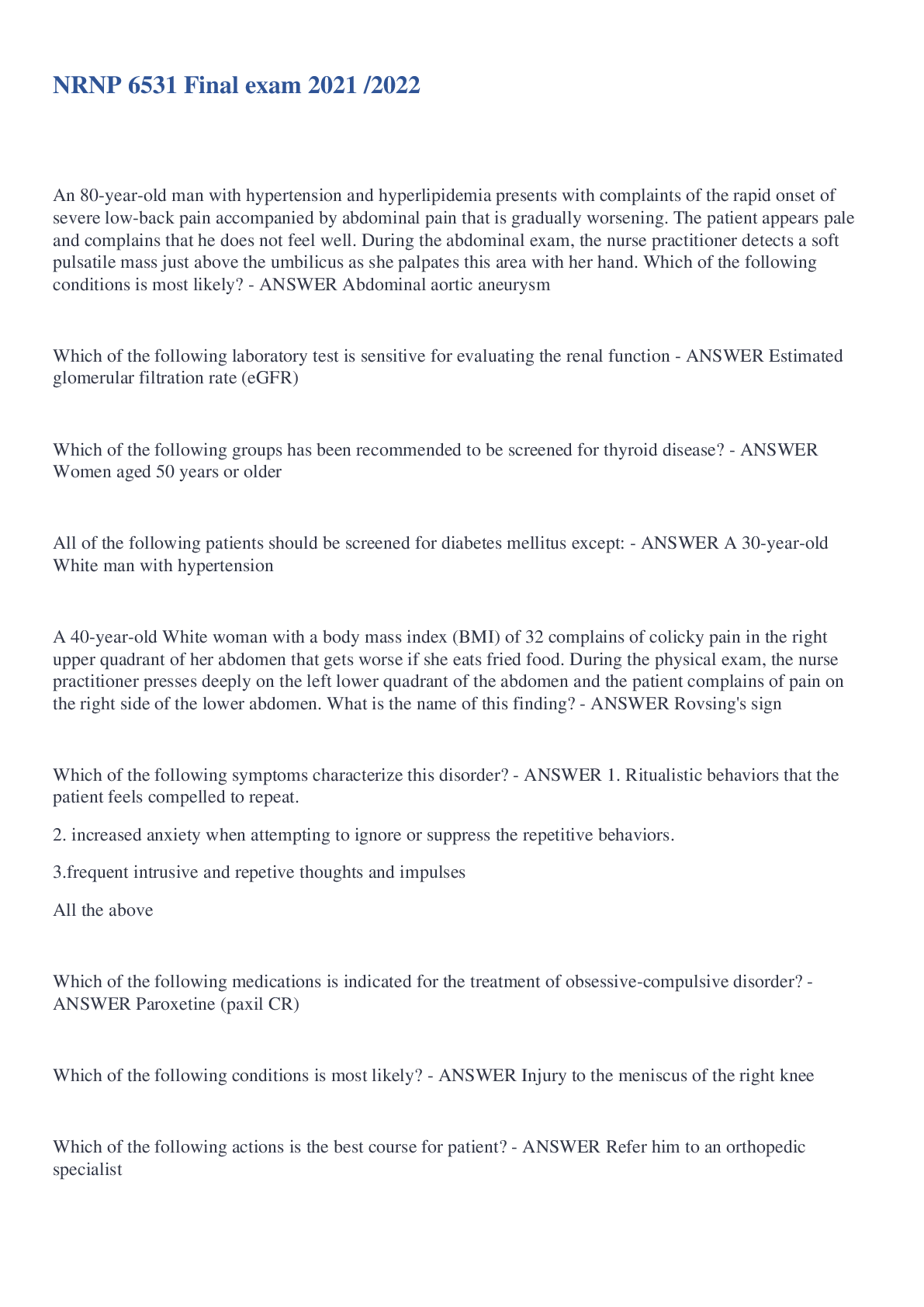
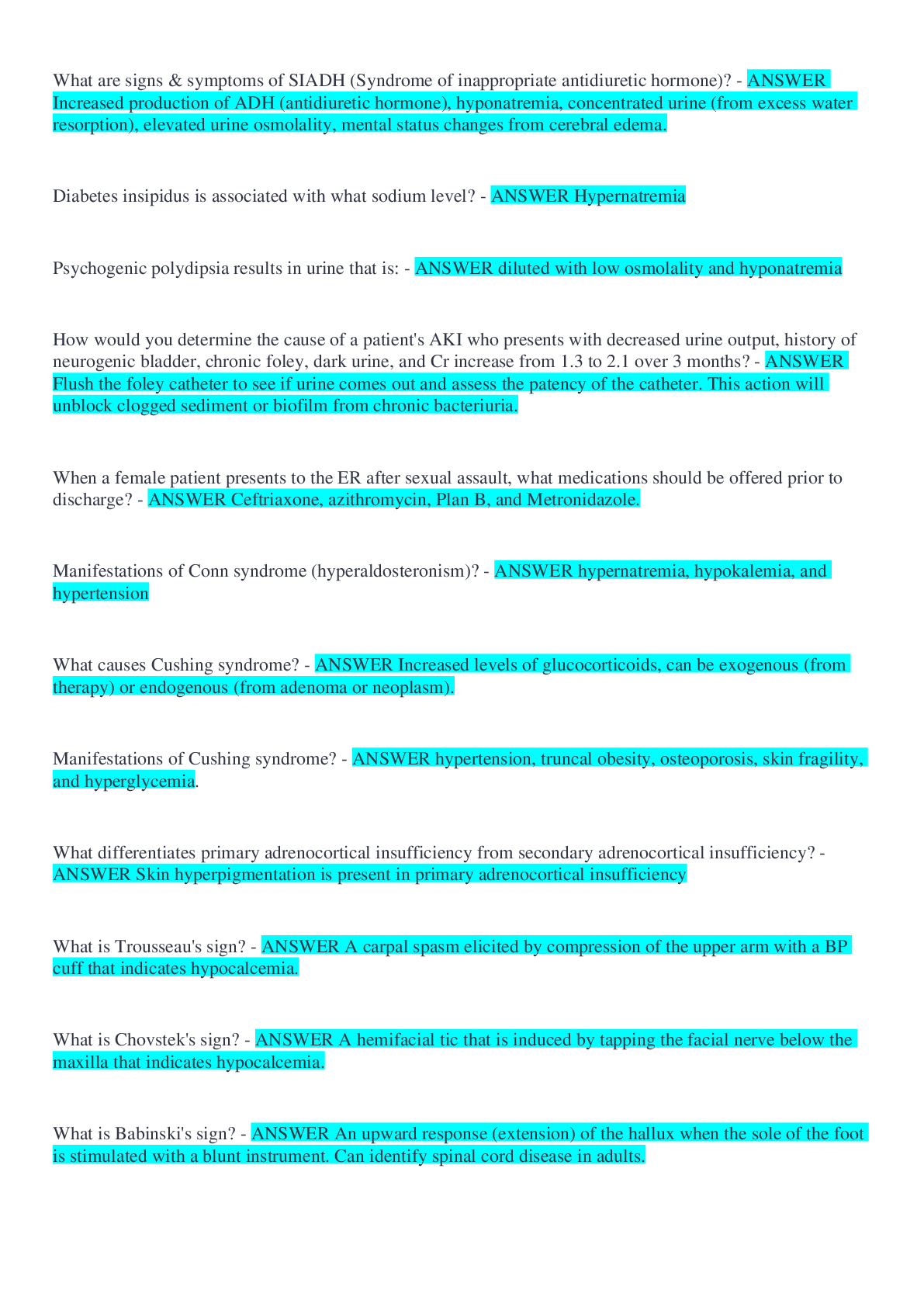
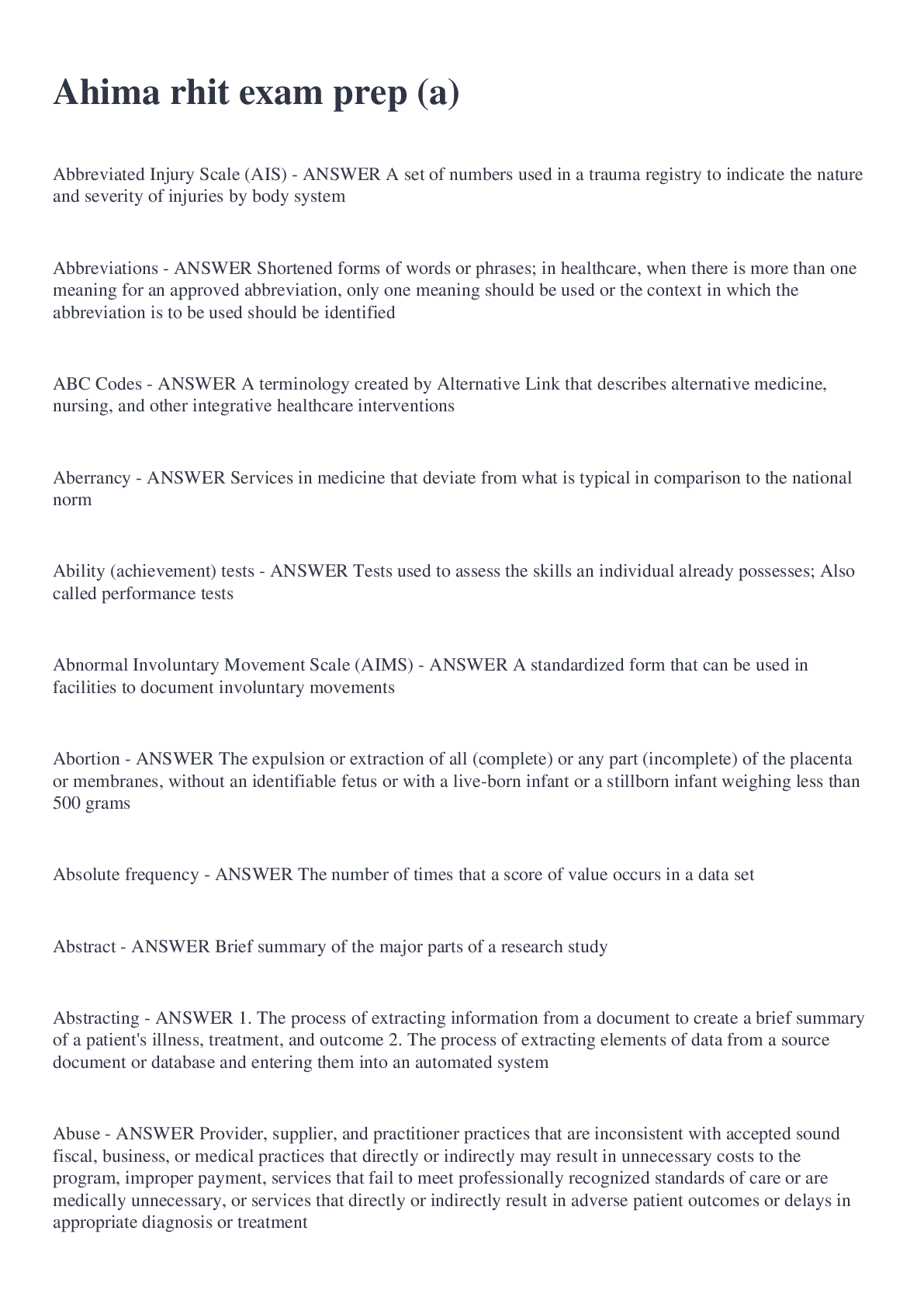
.png)
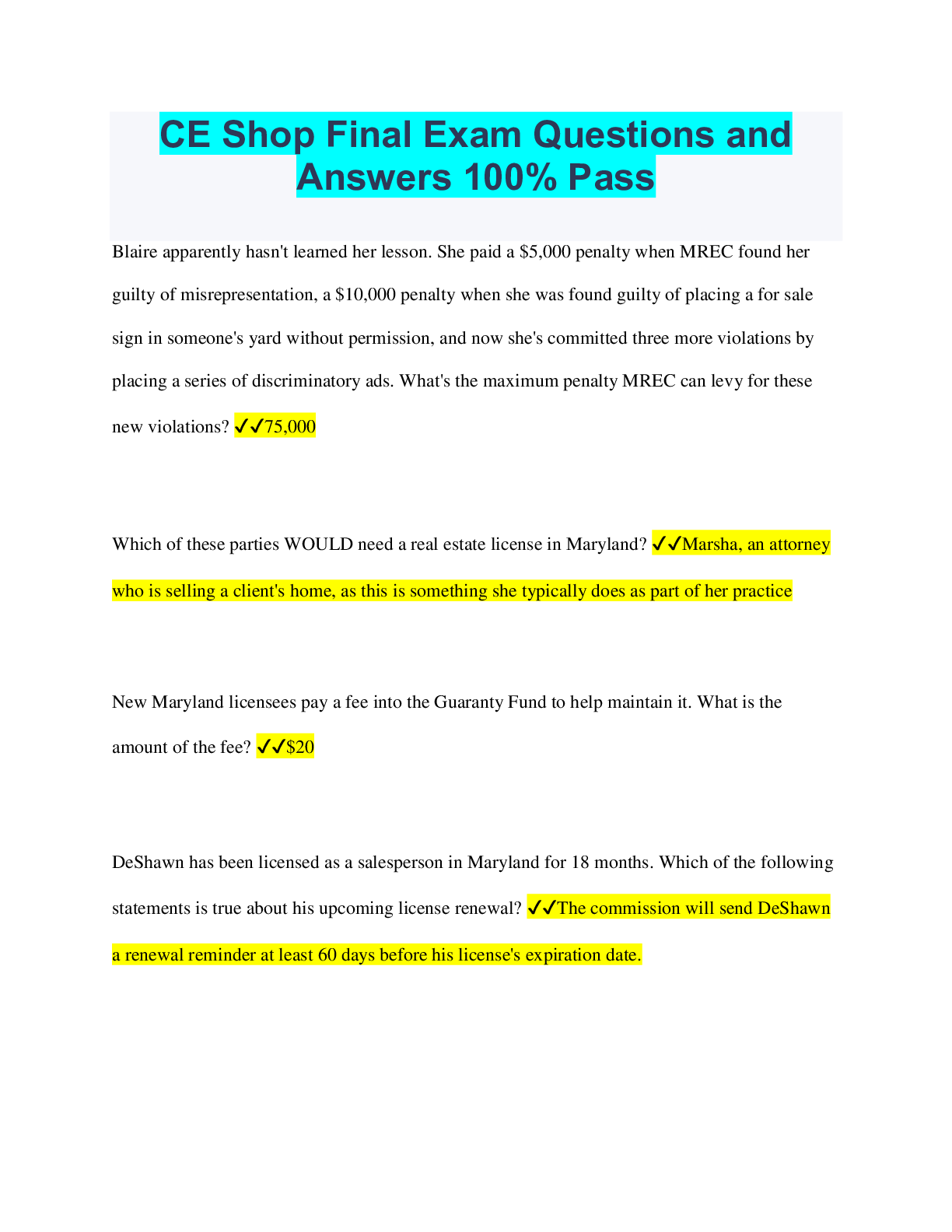
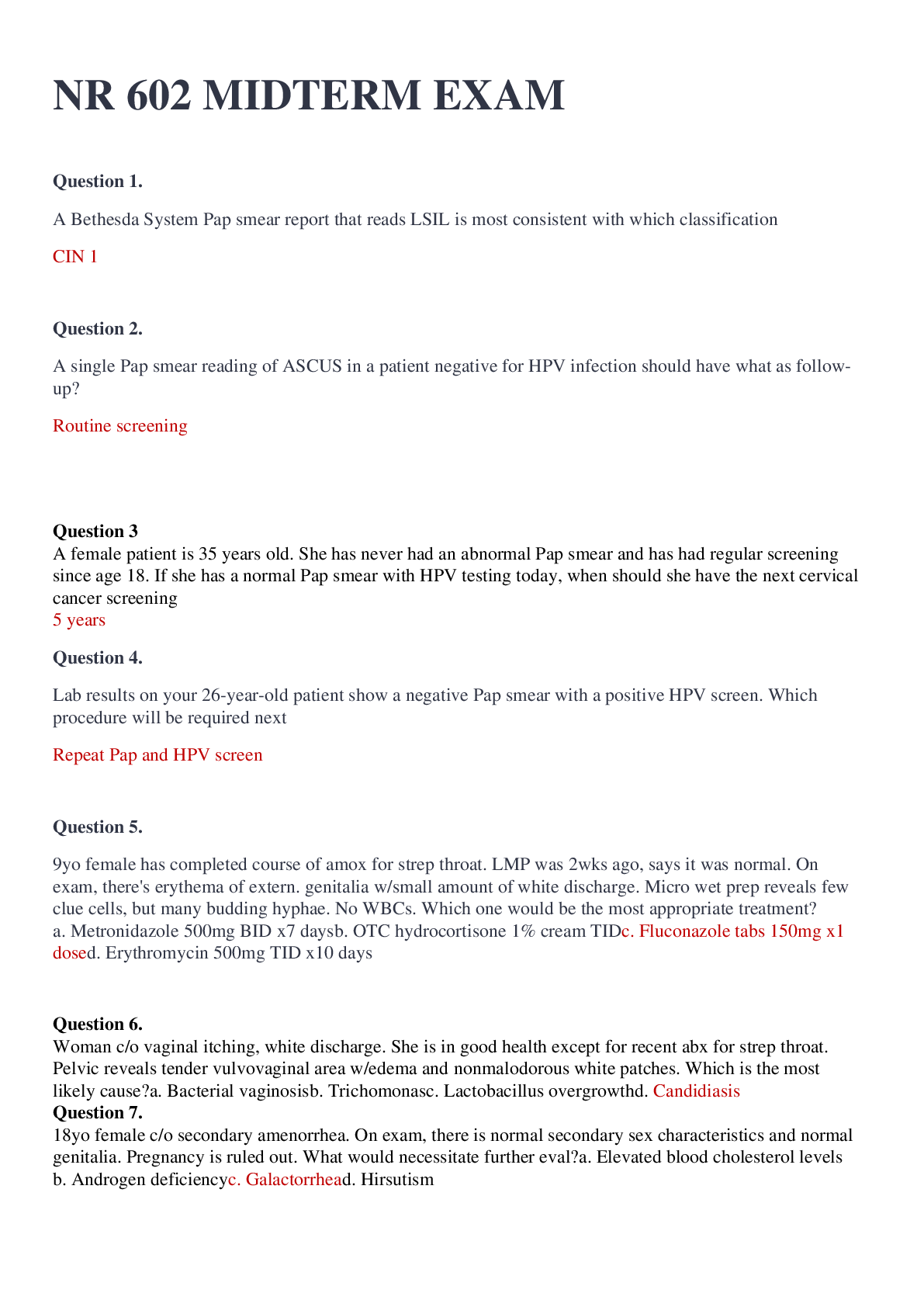
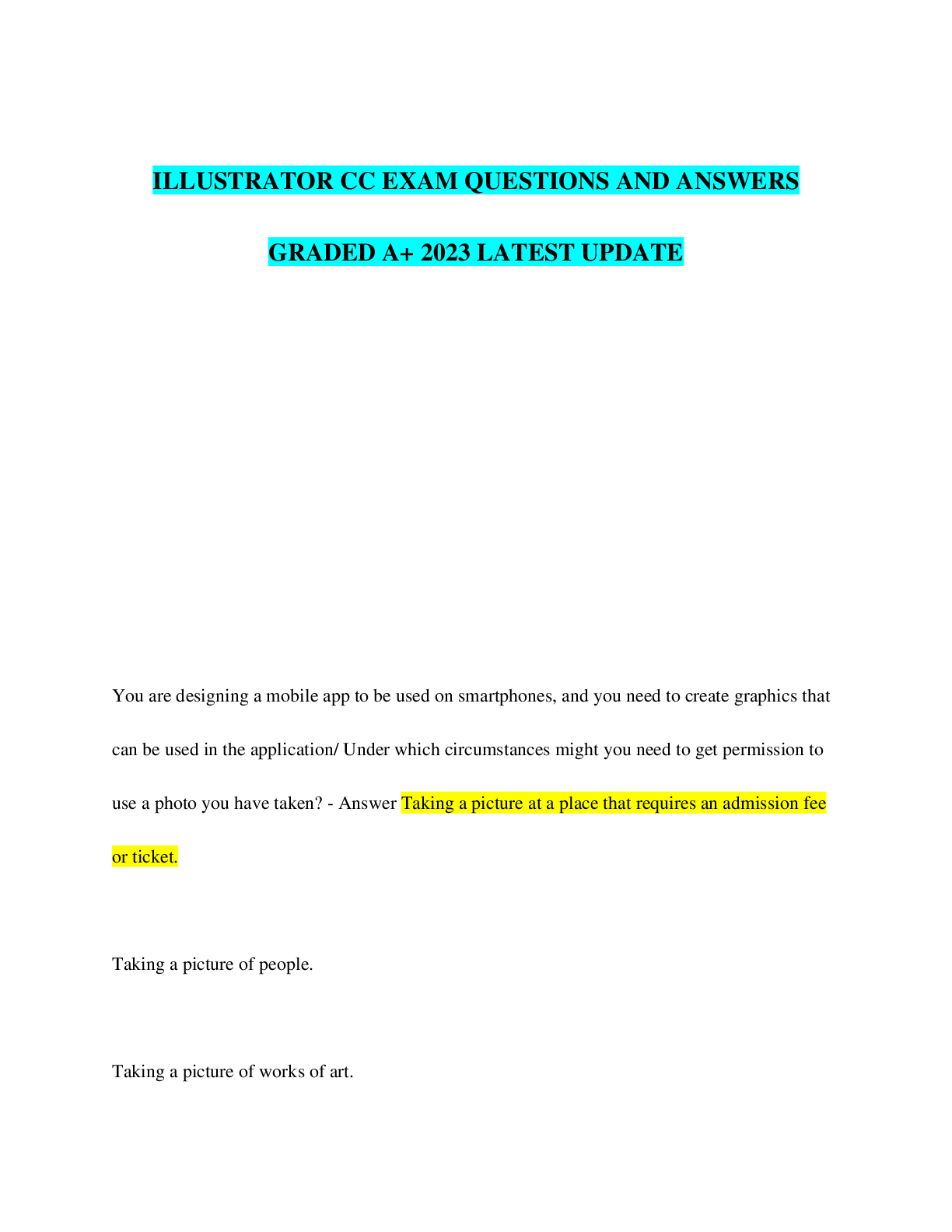
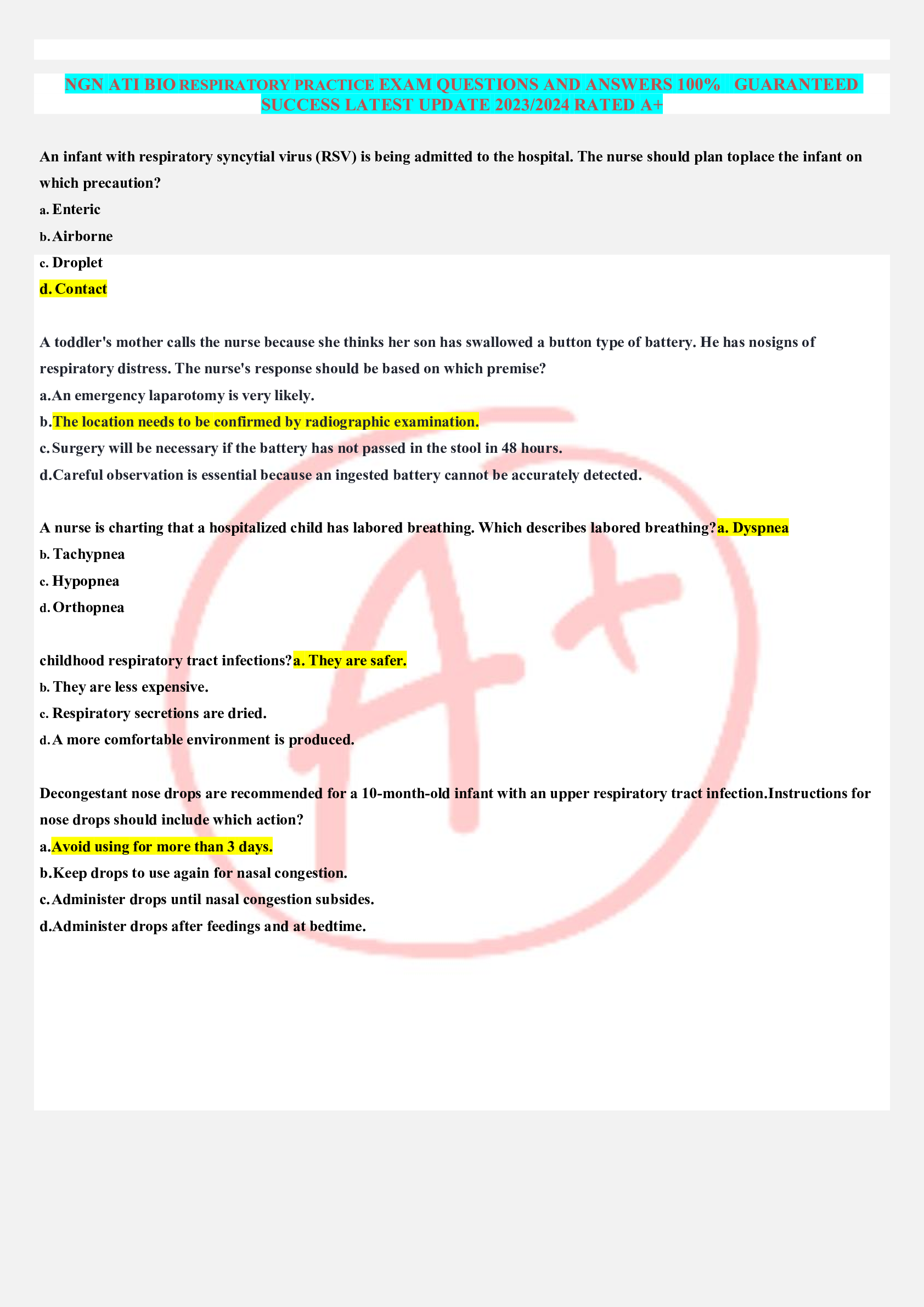
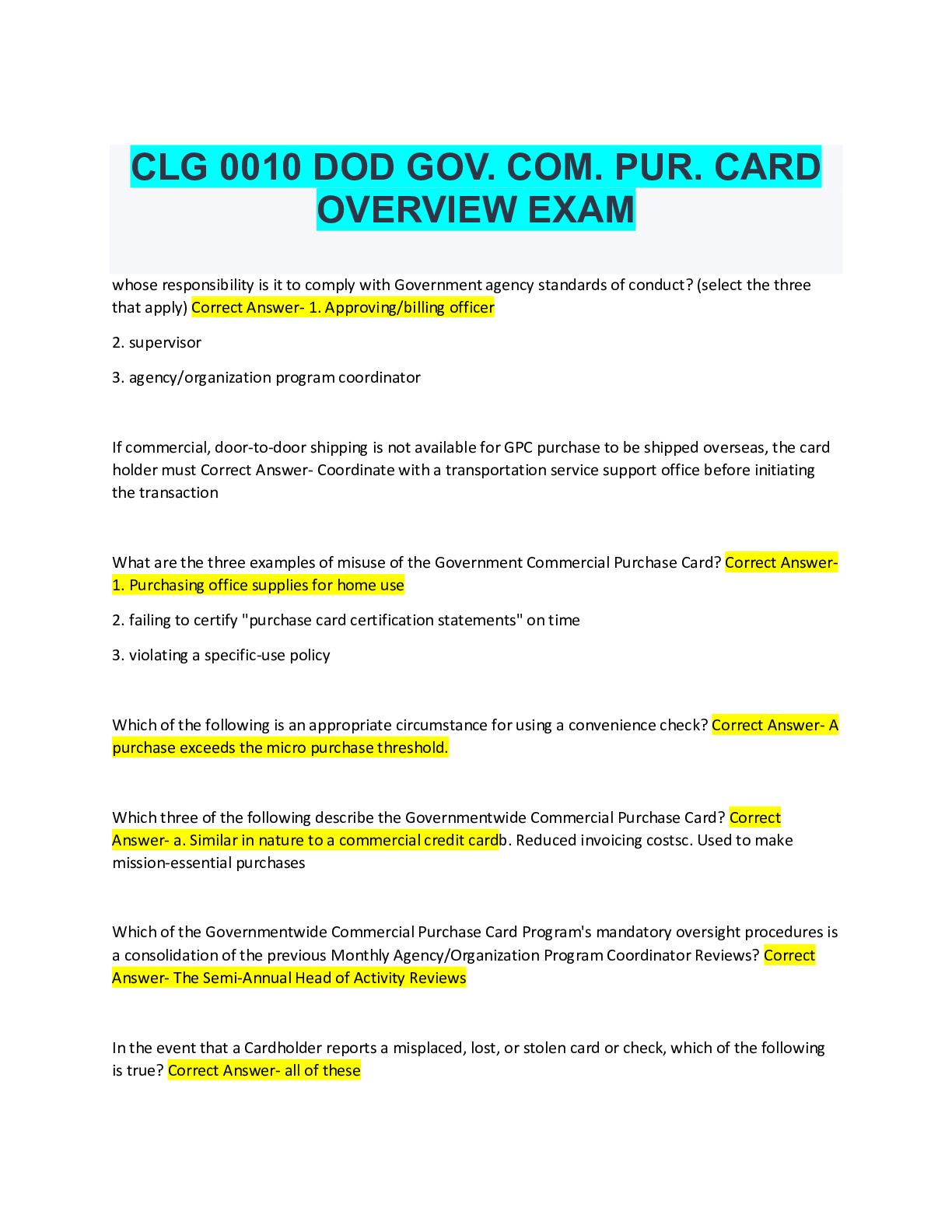
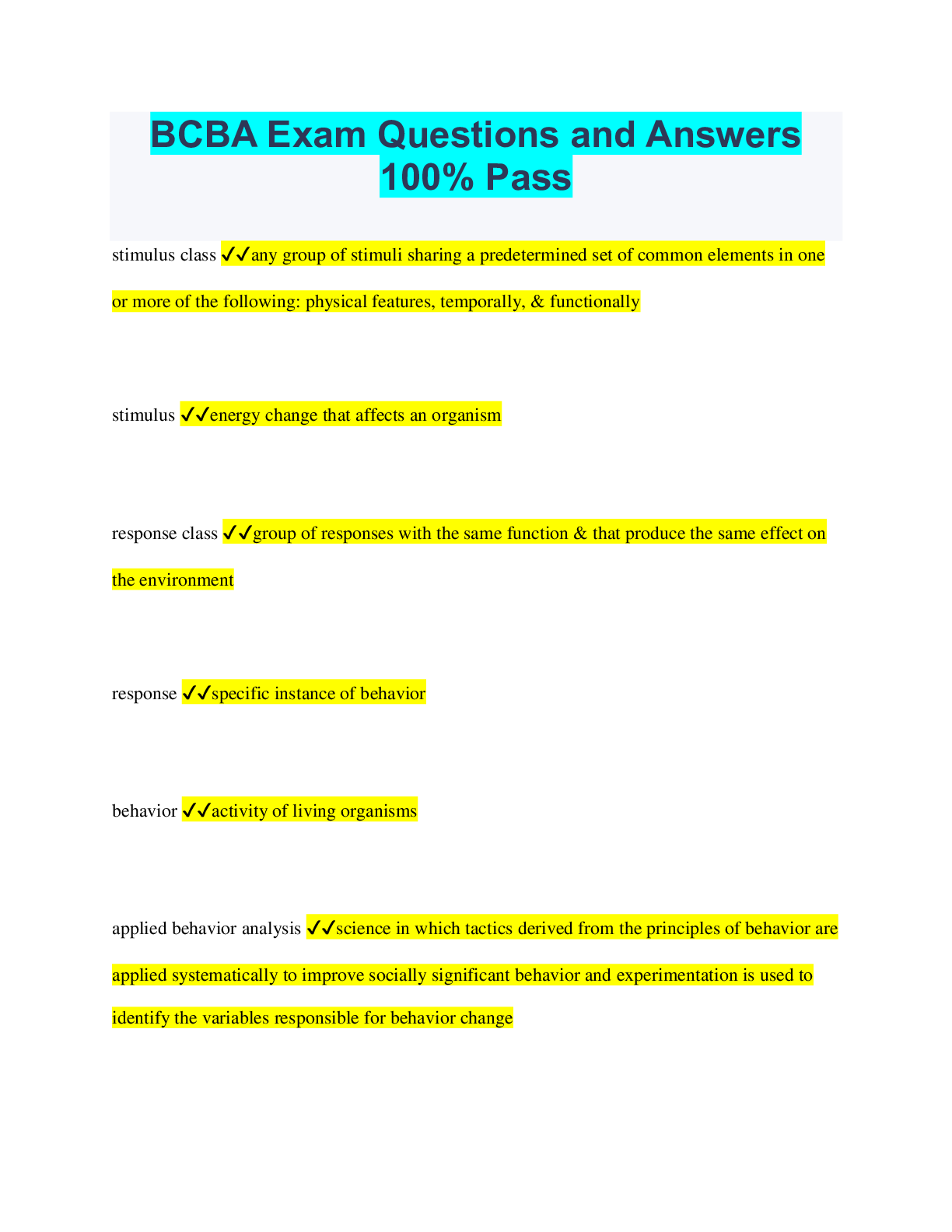
.png)
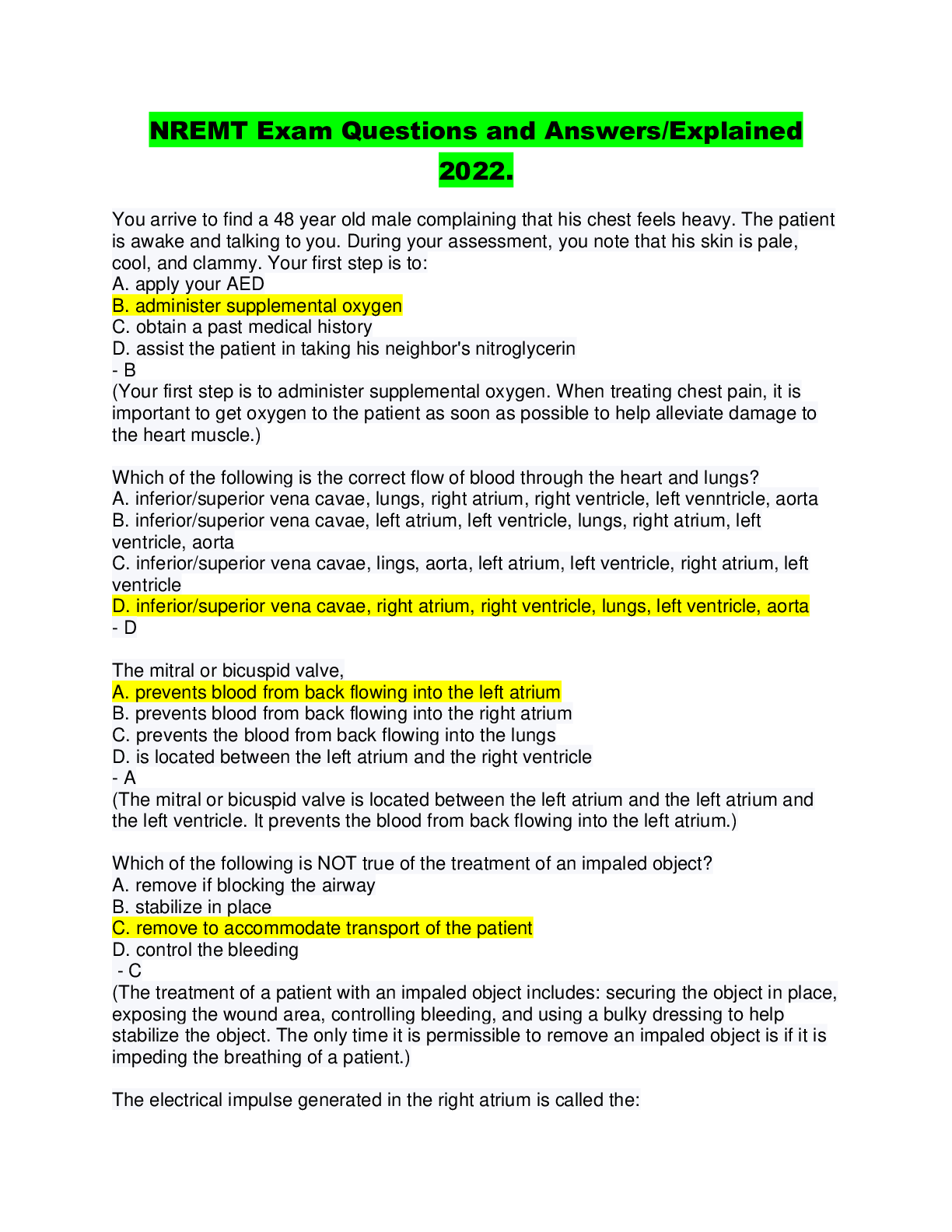
.png)
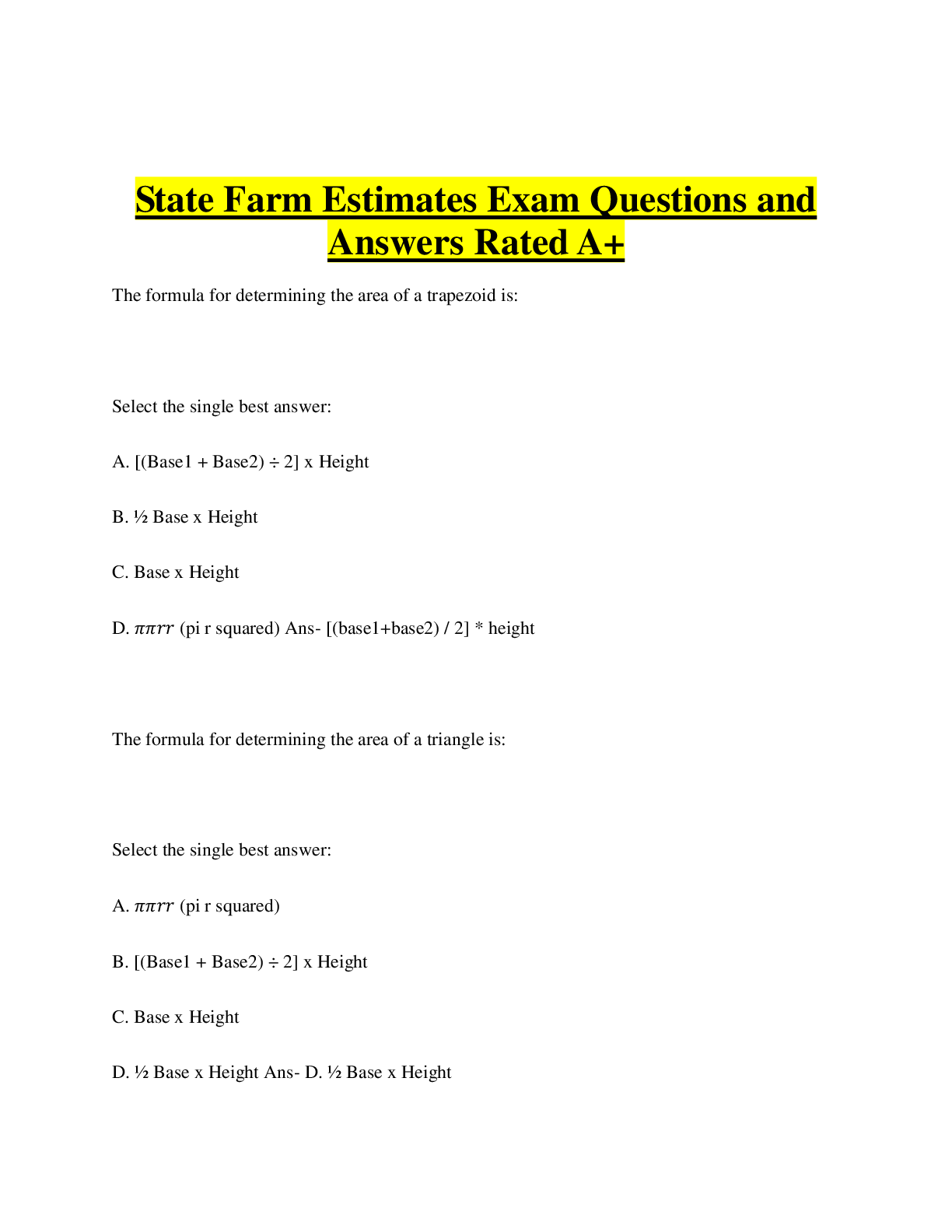

.png)
